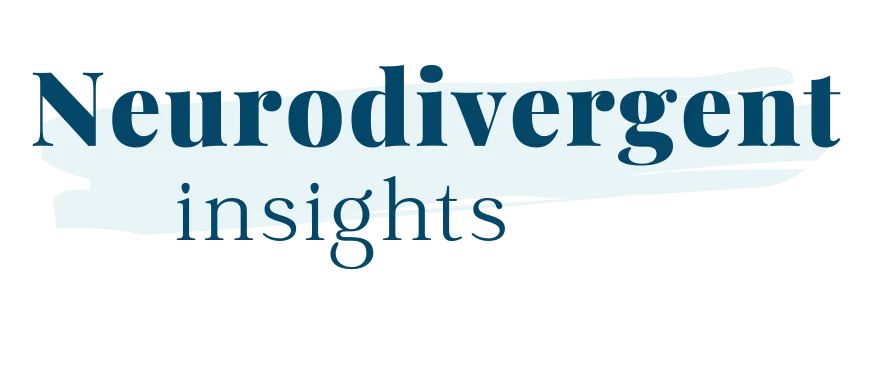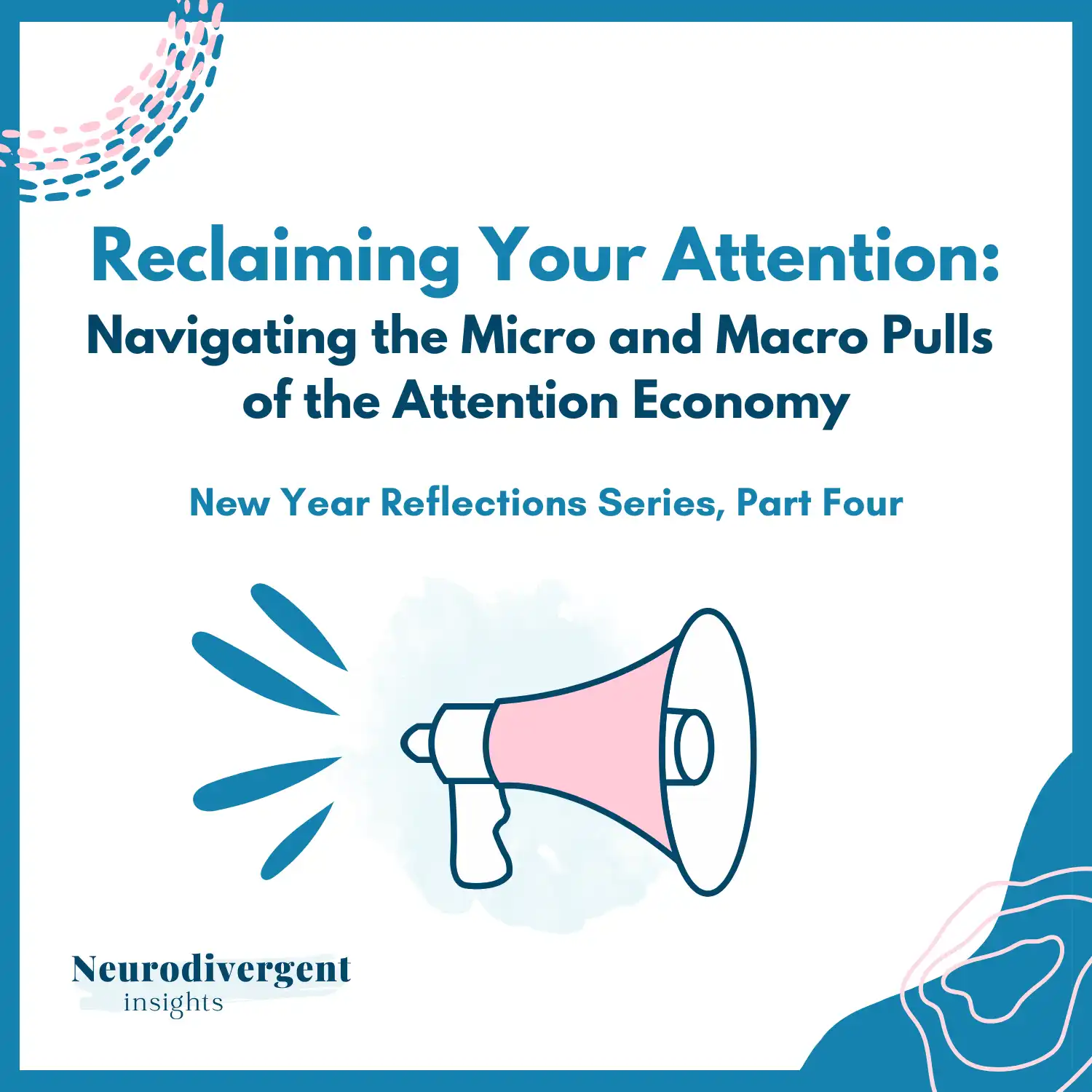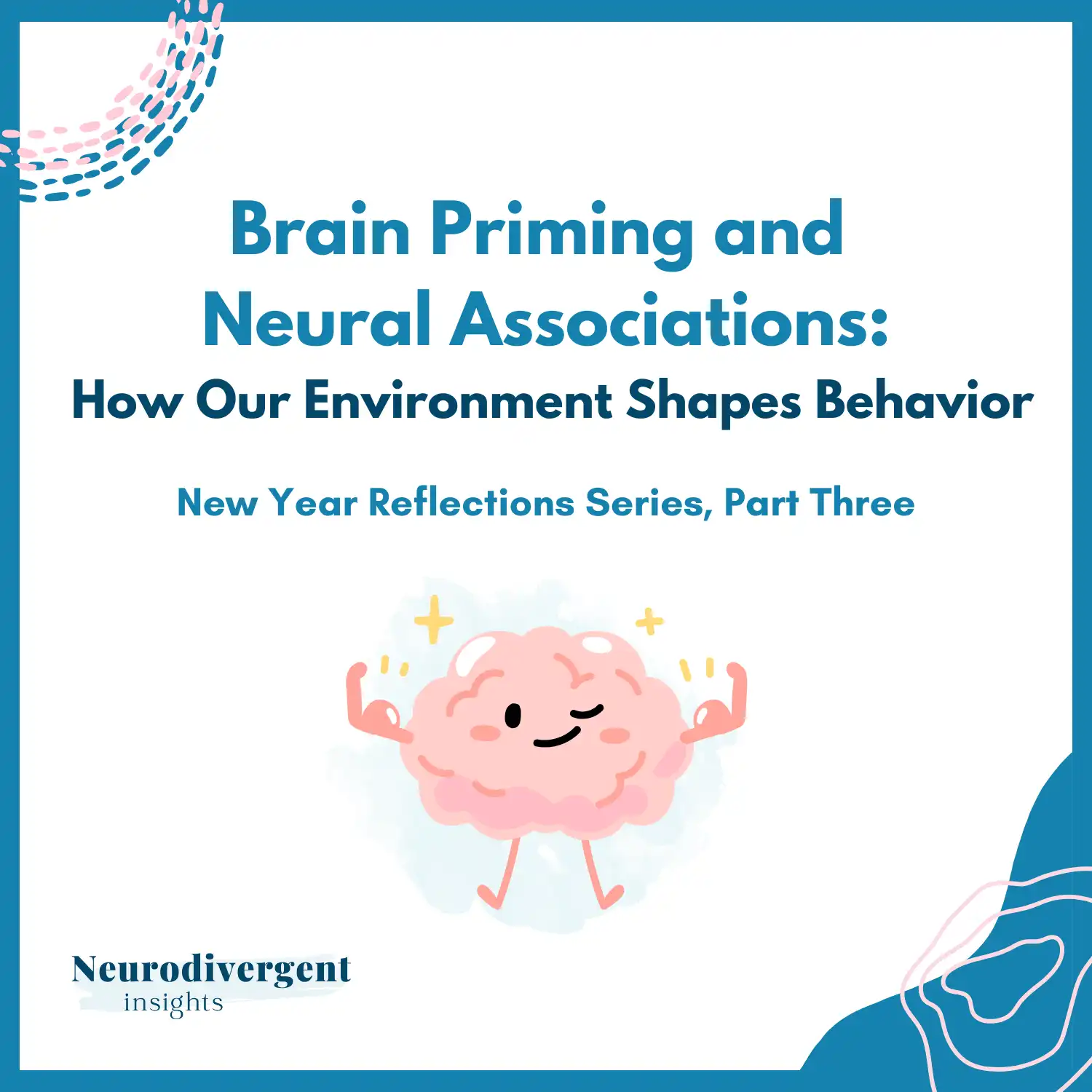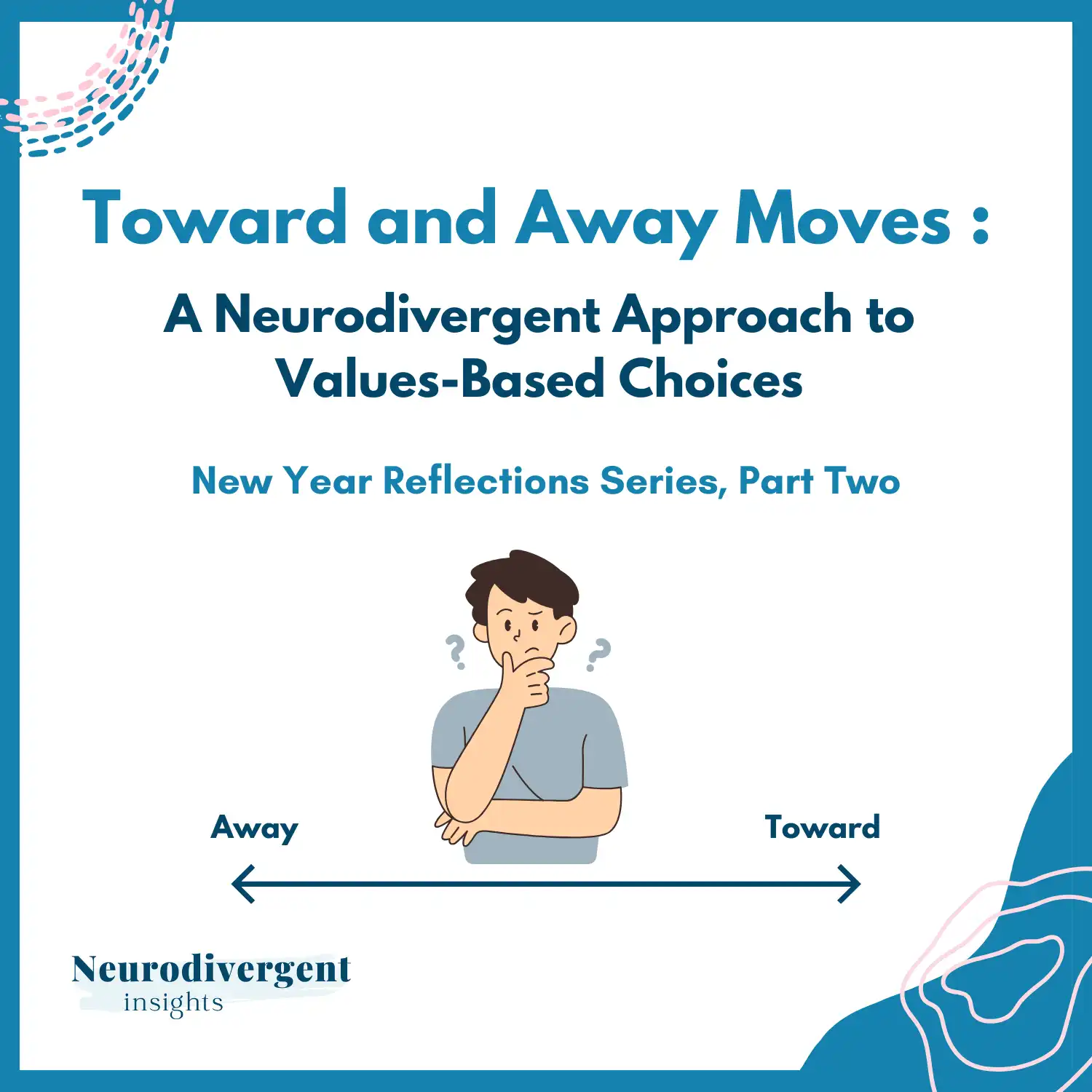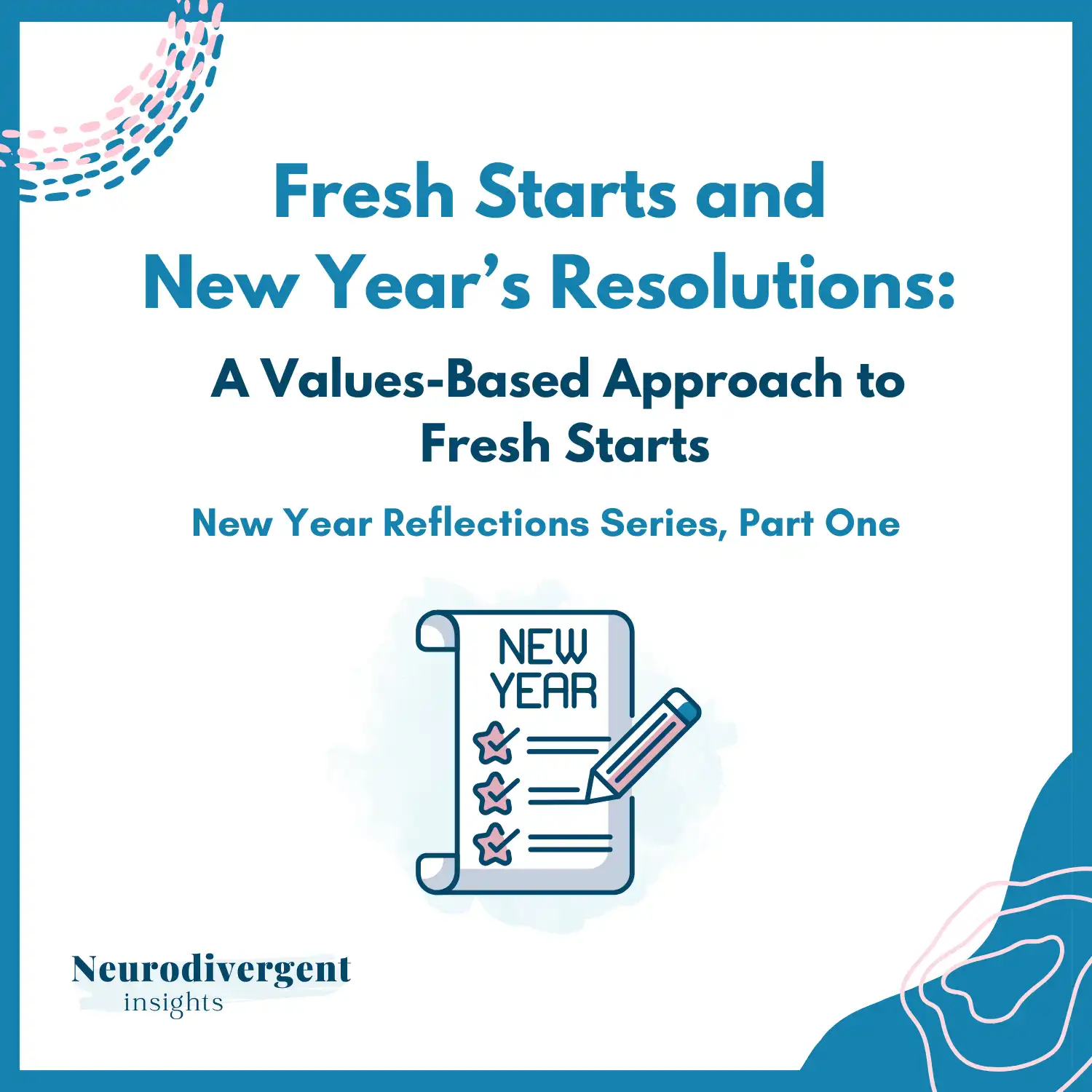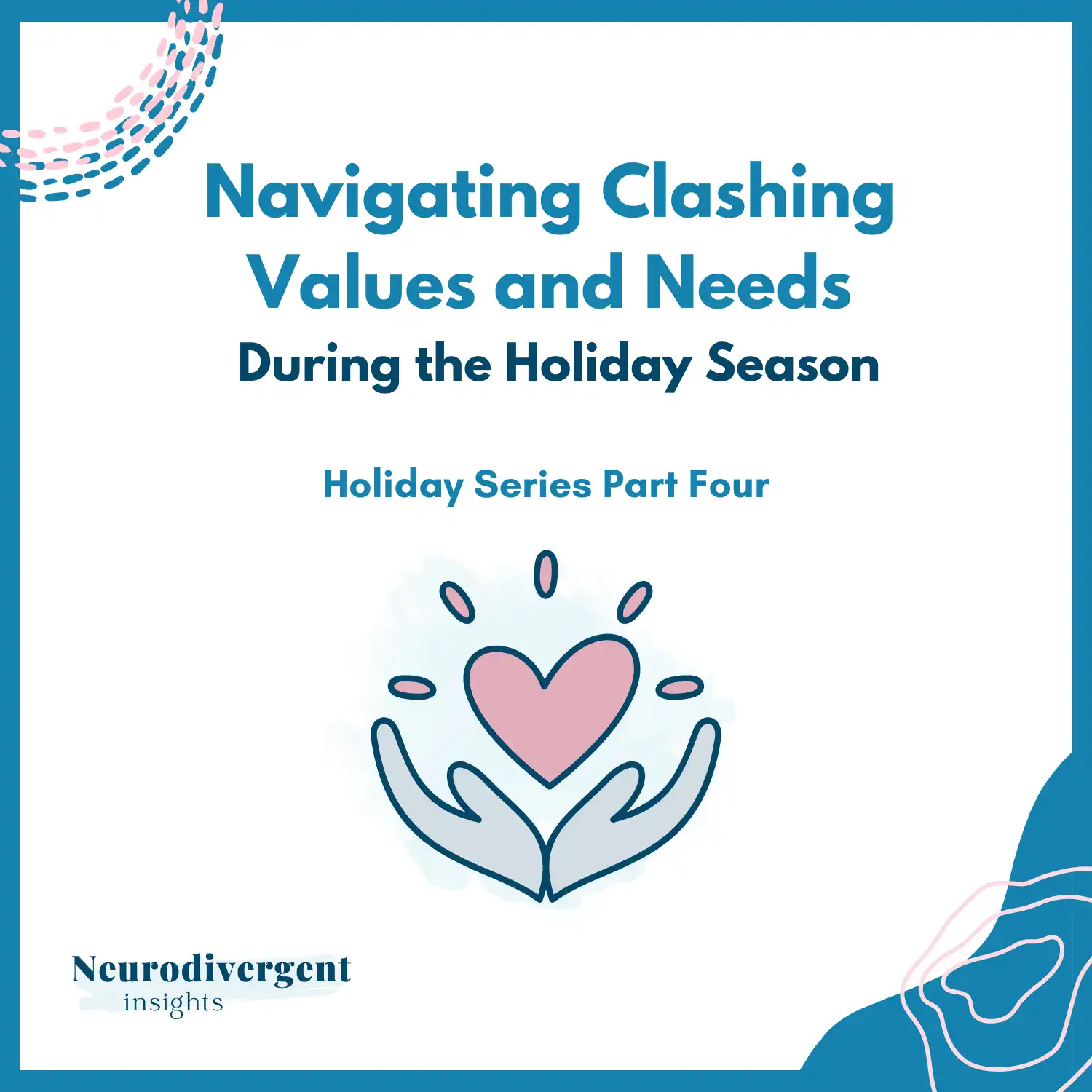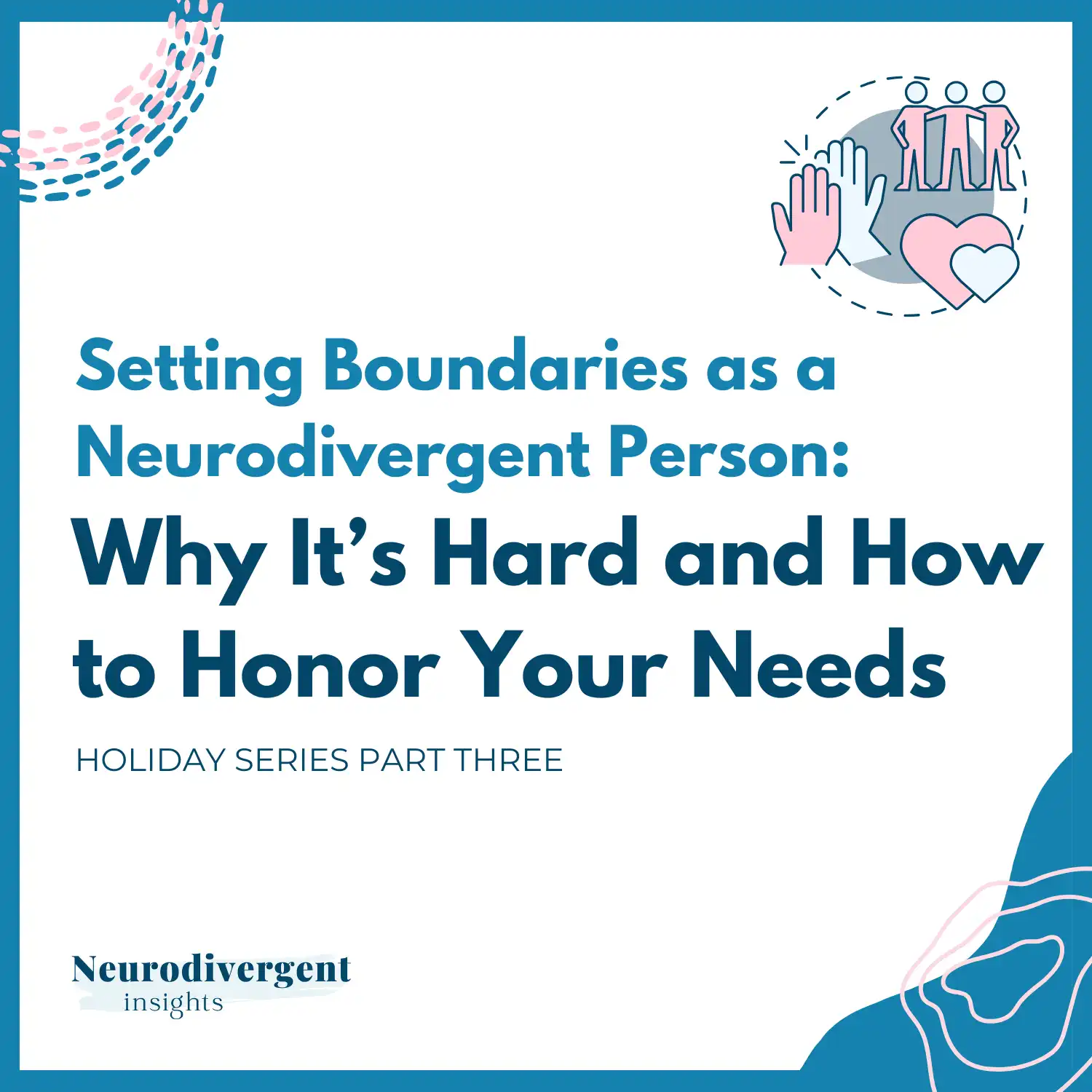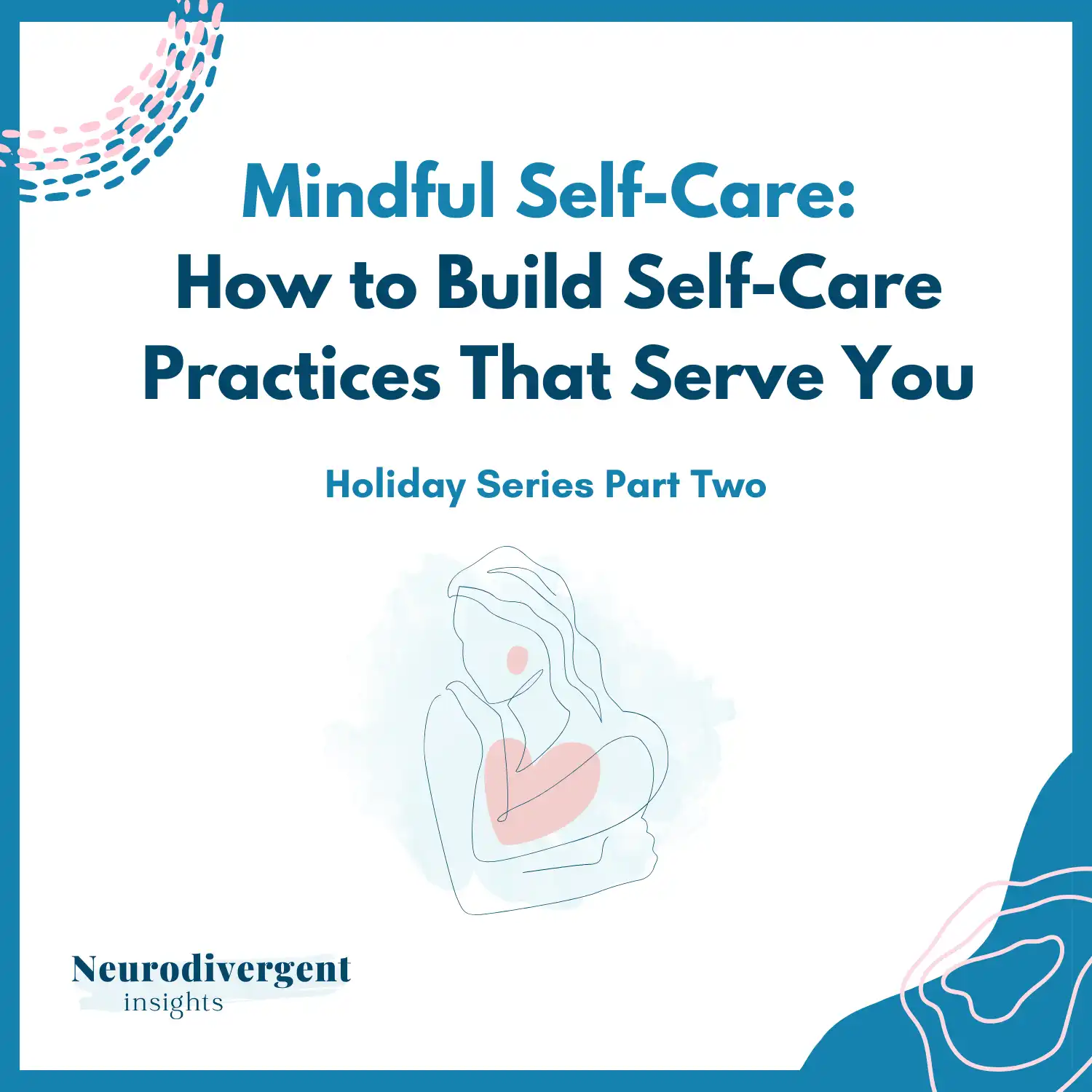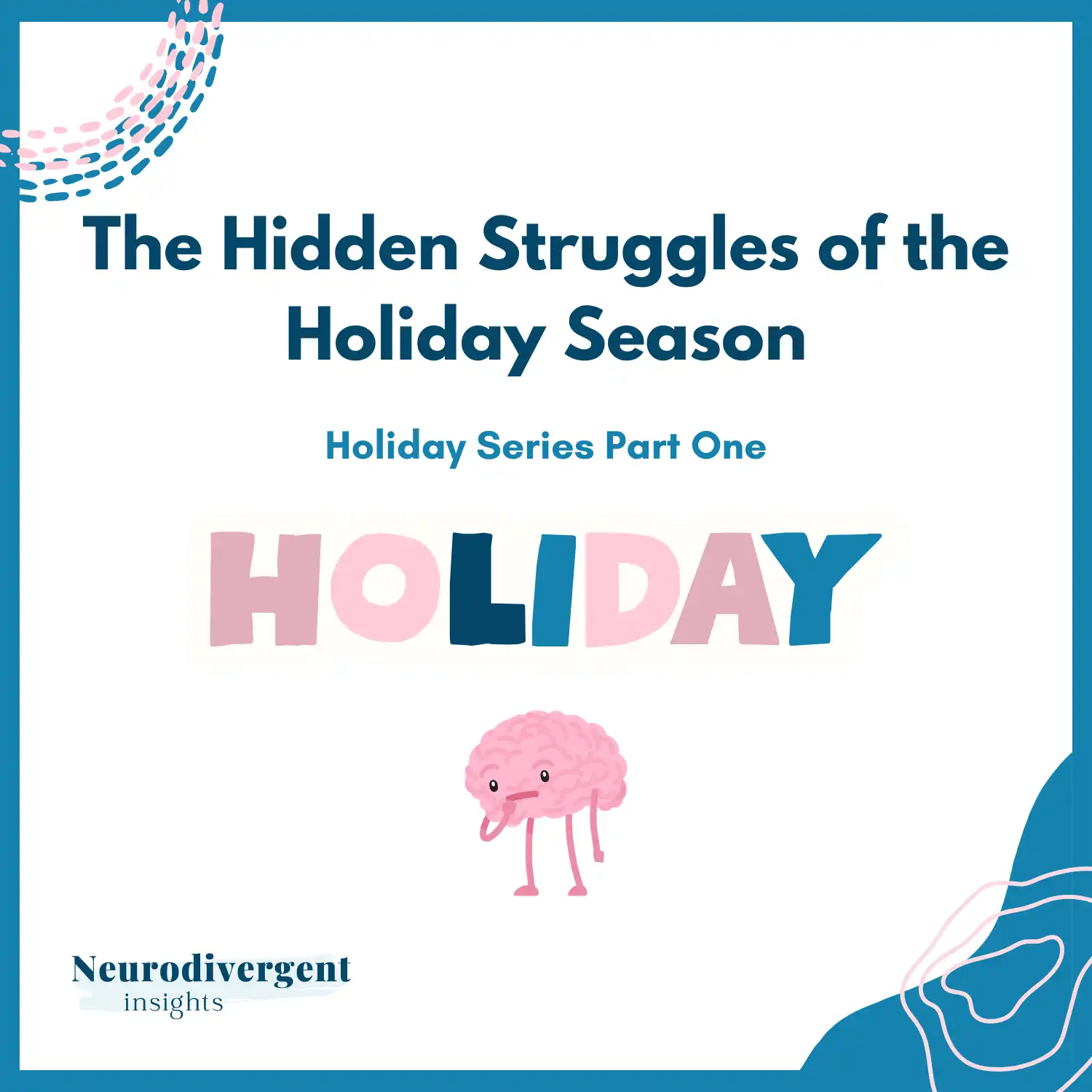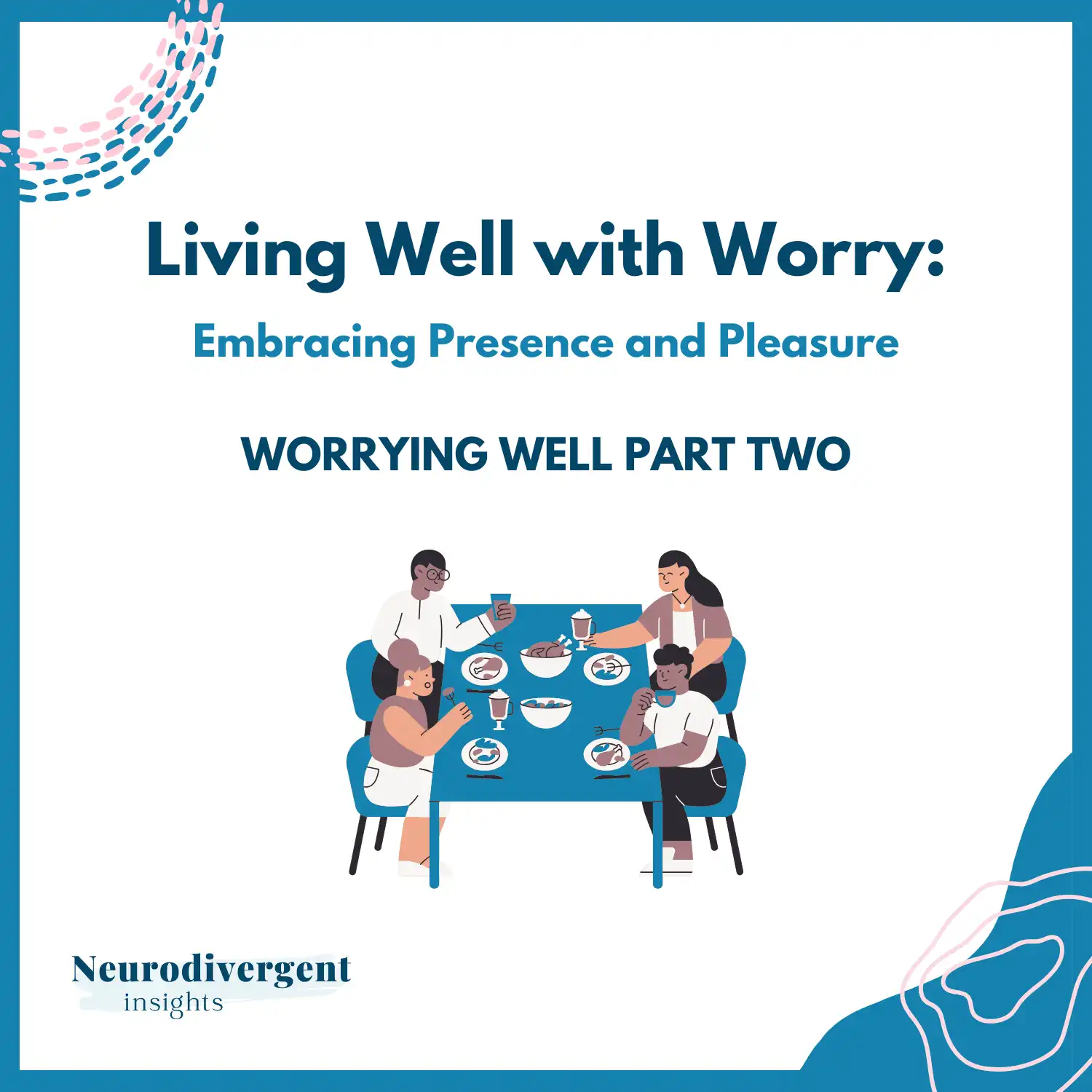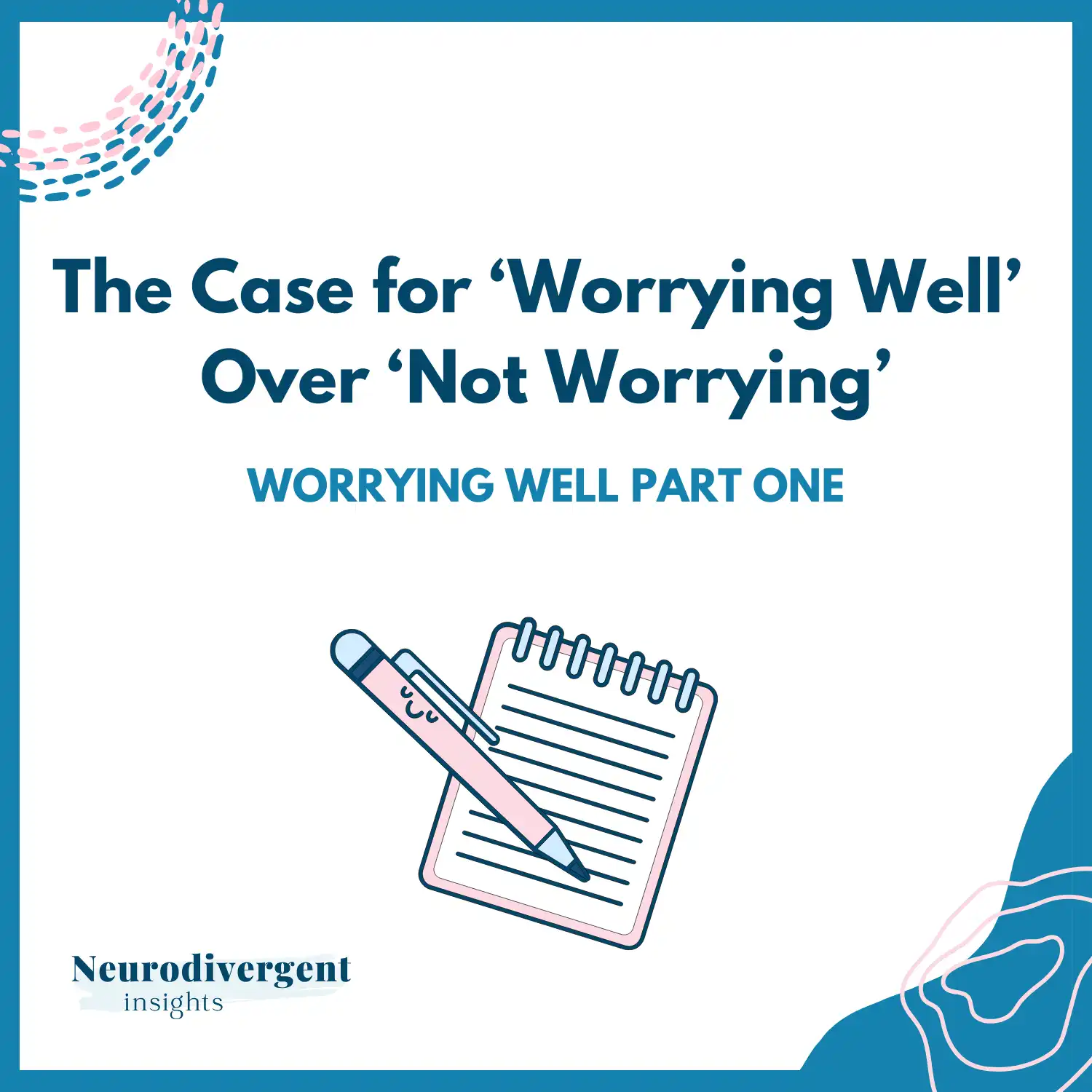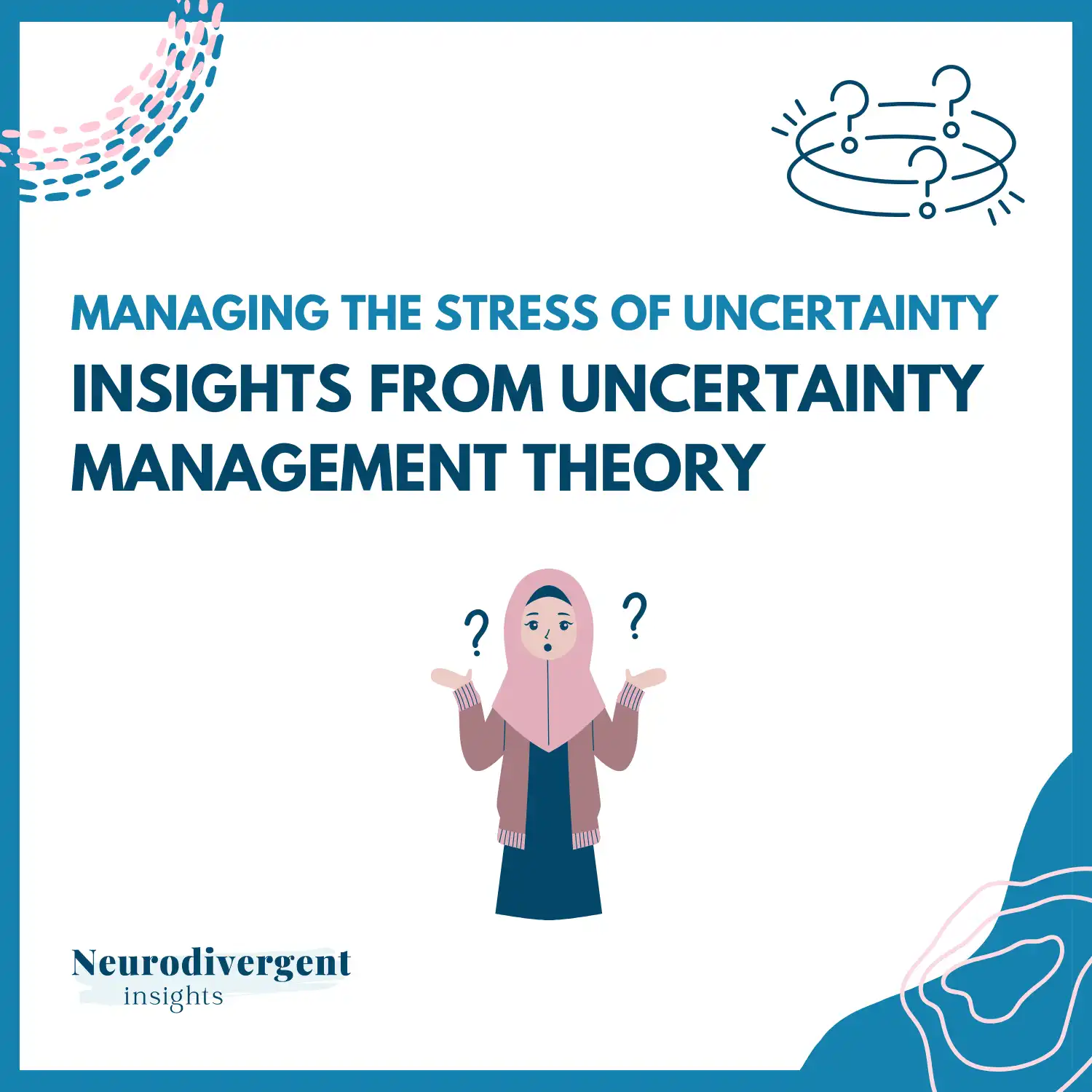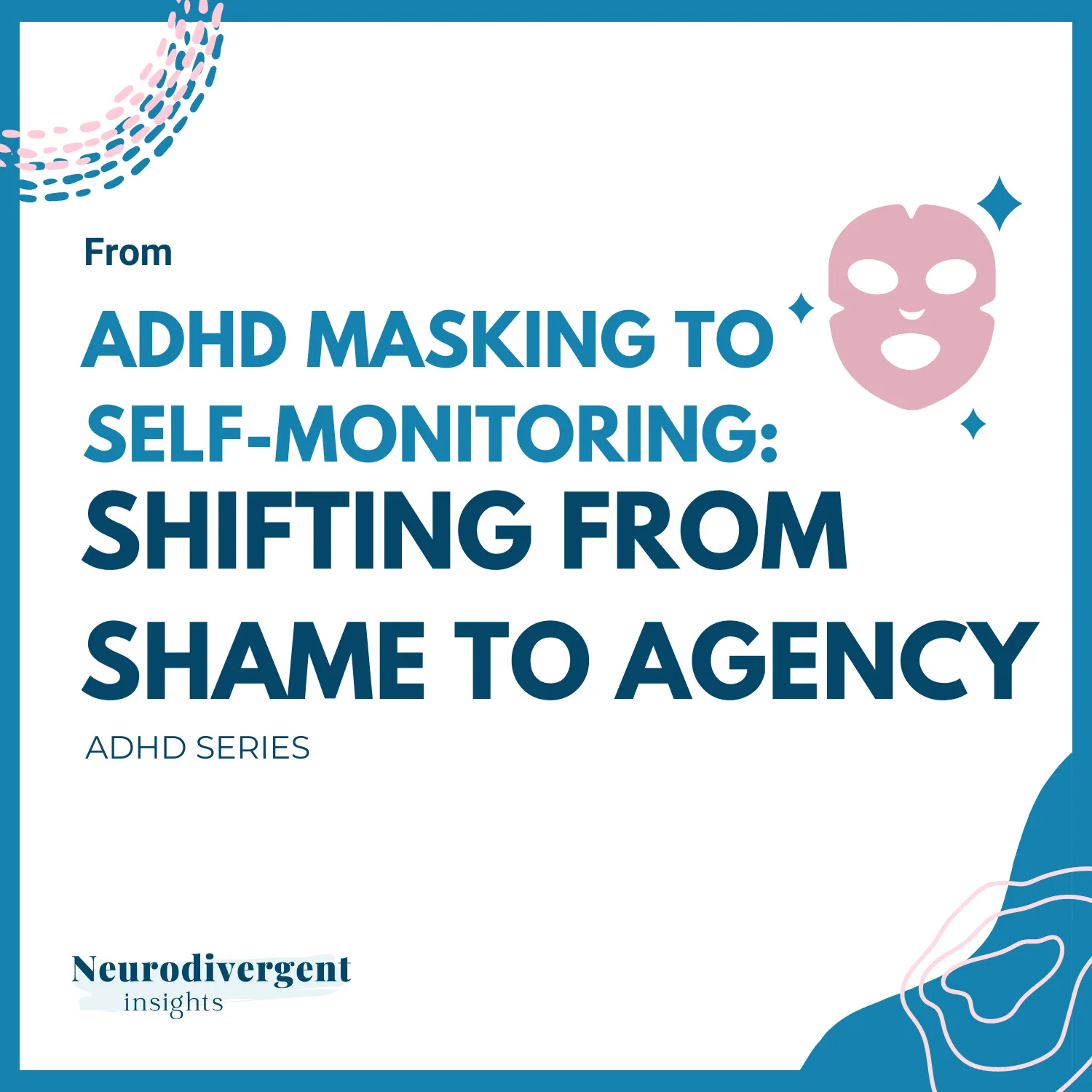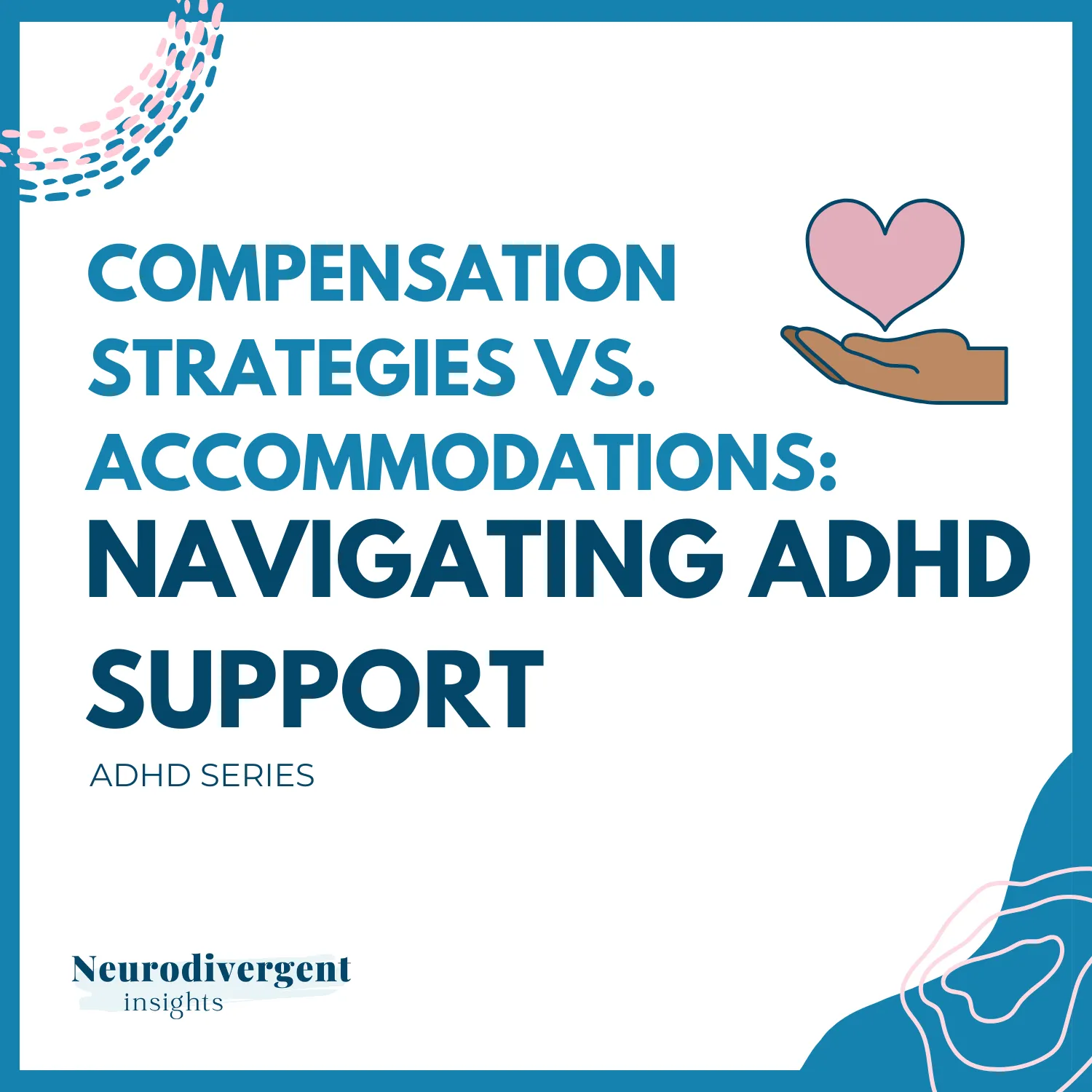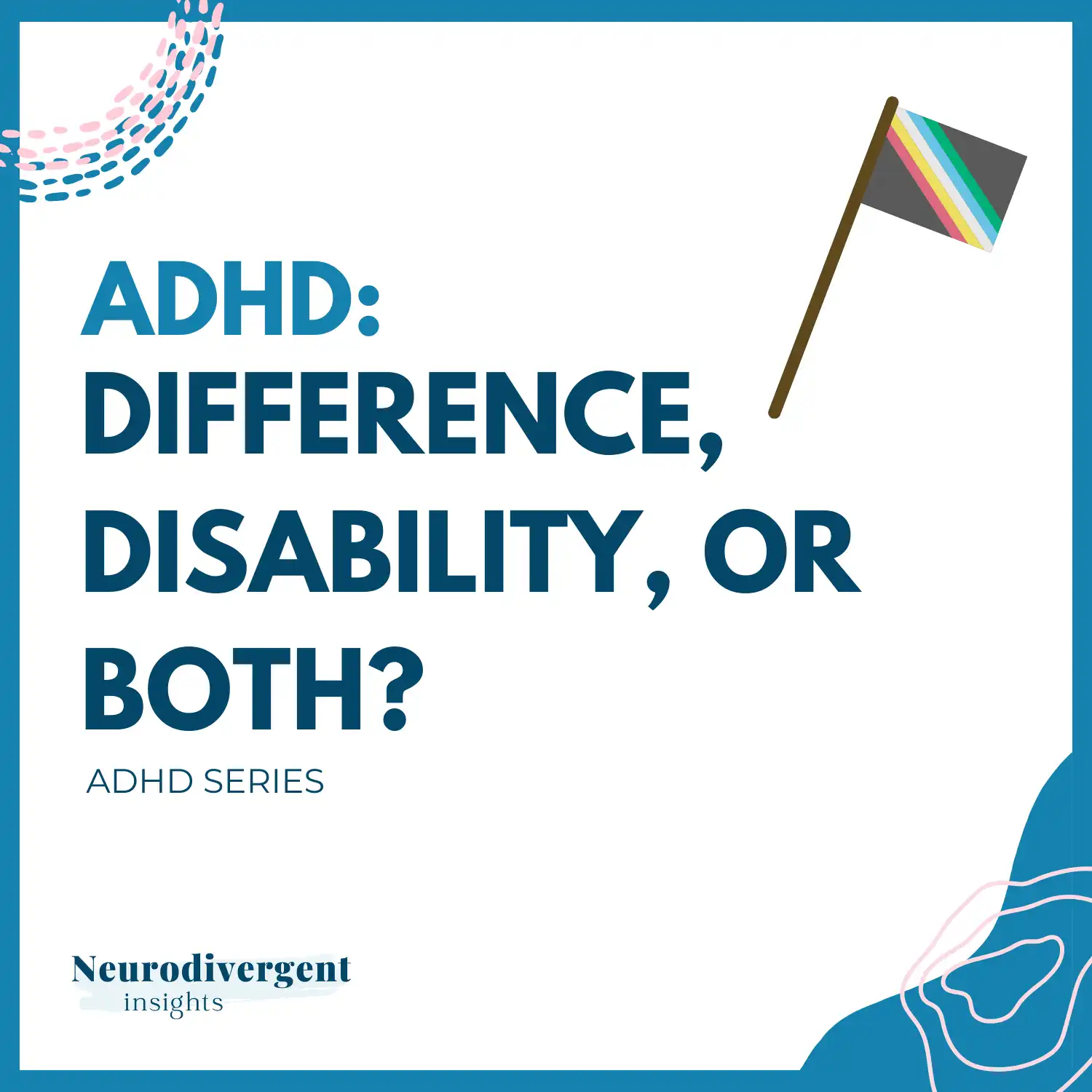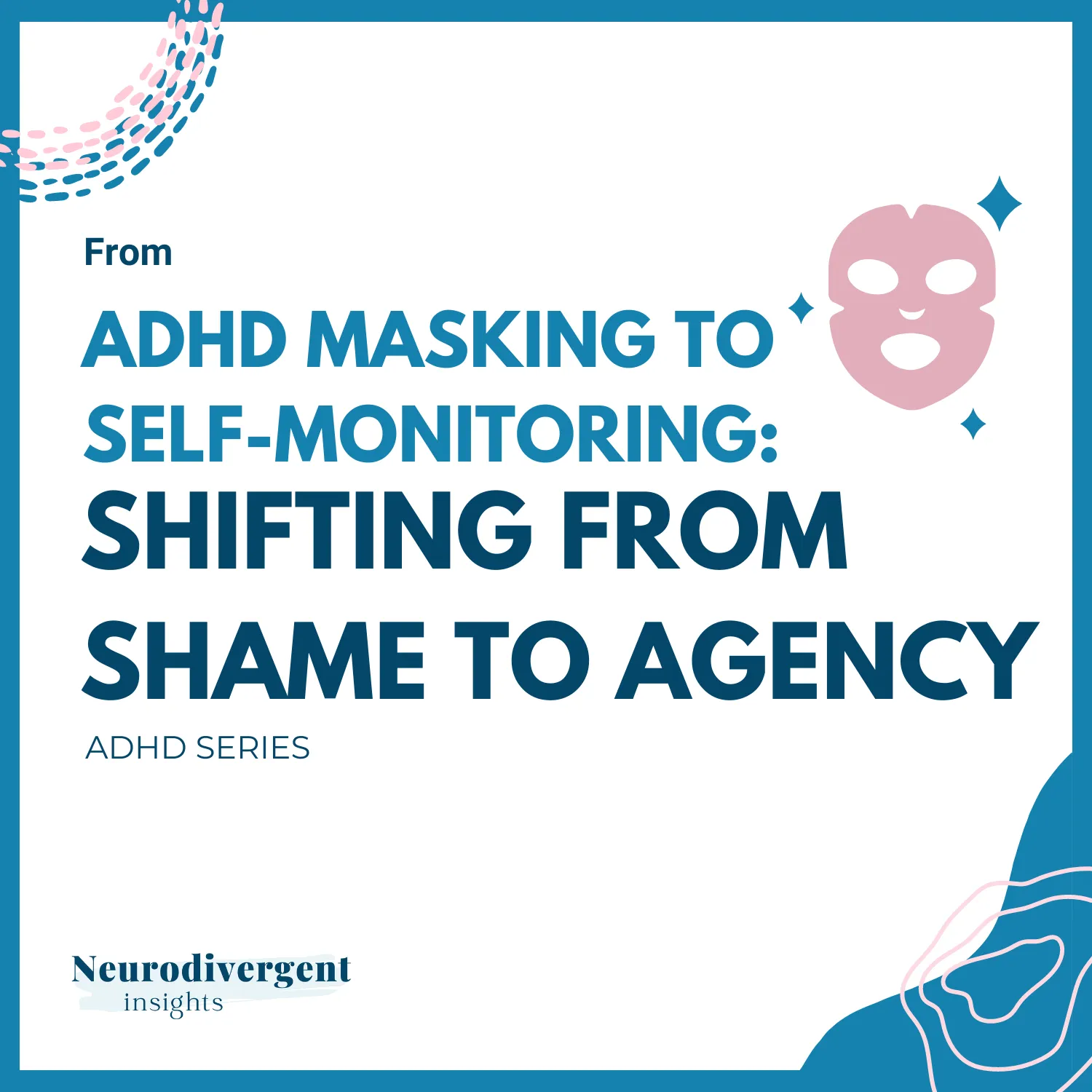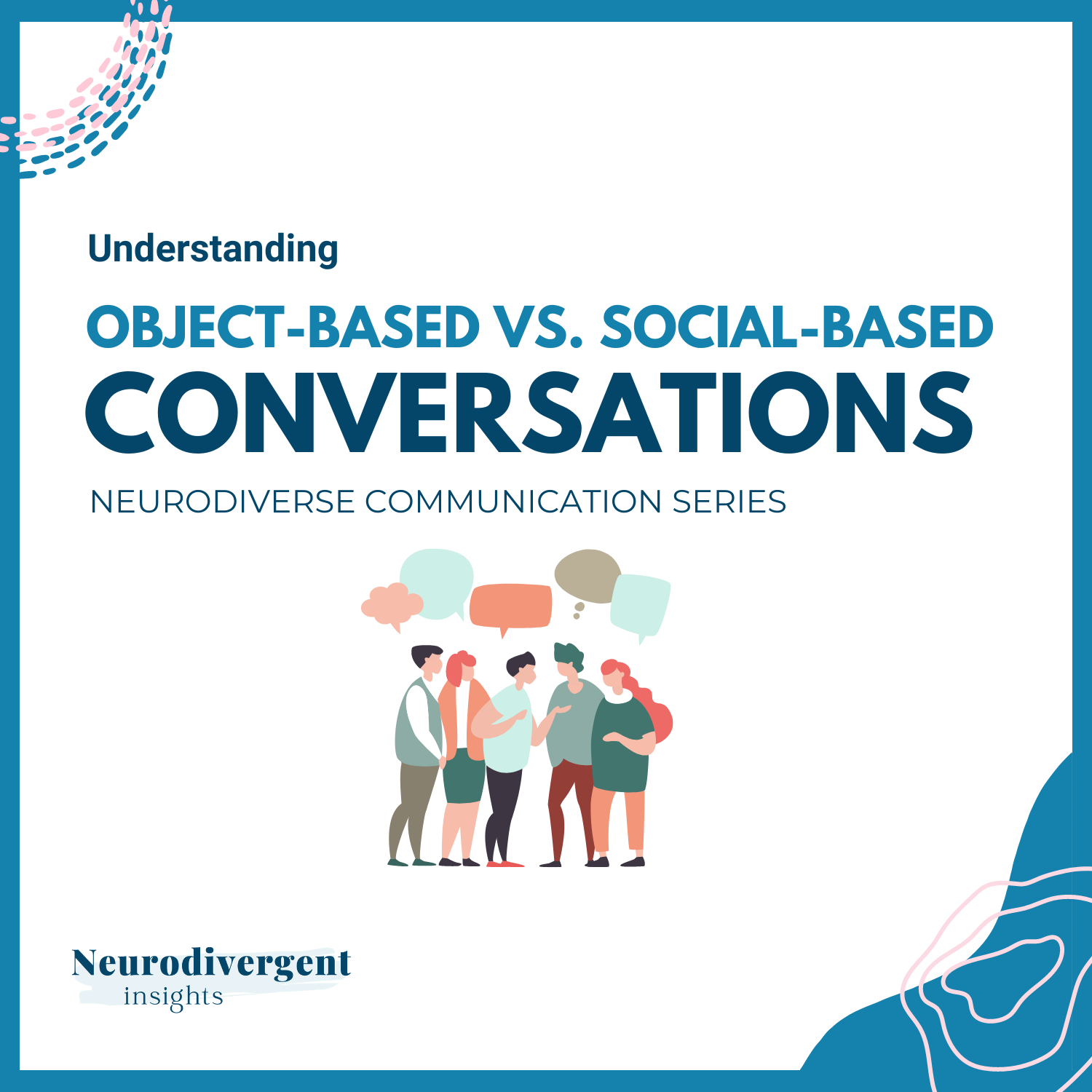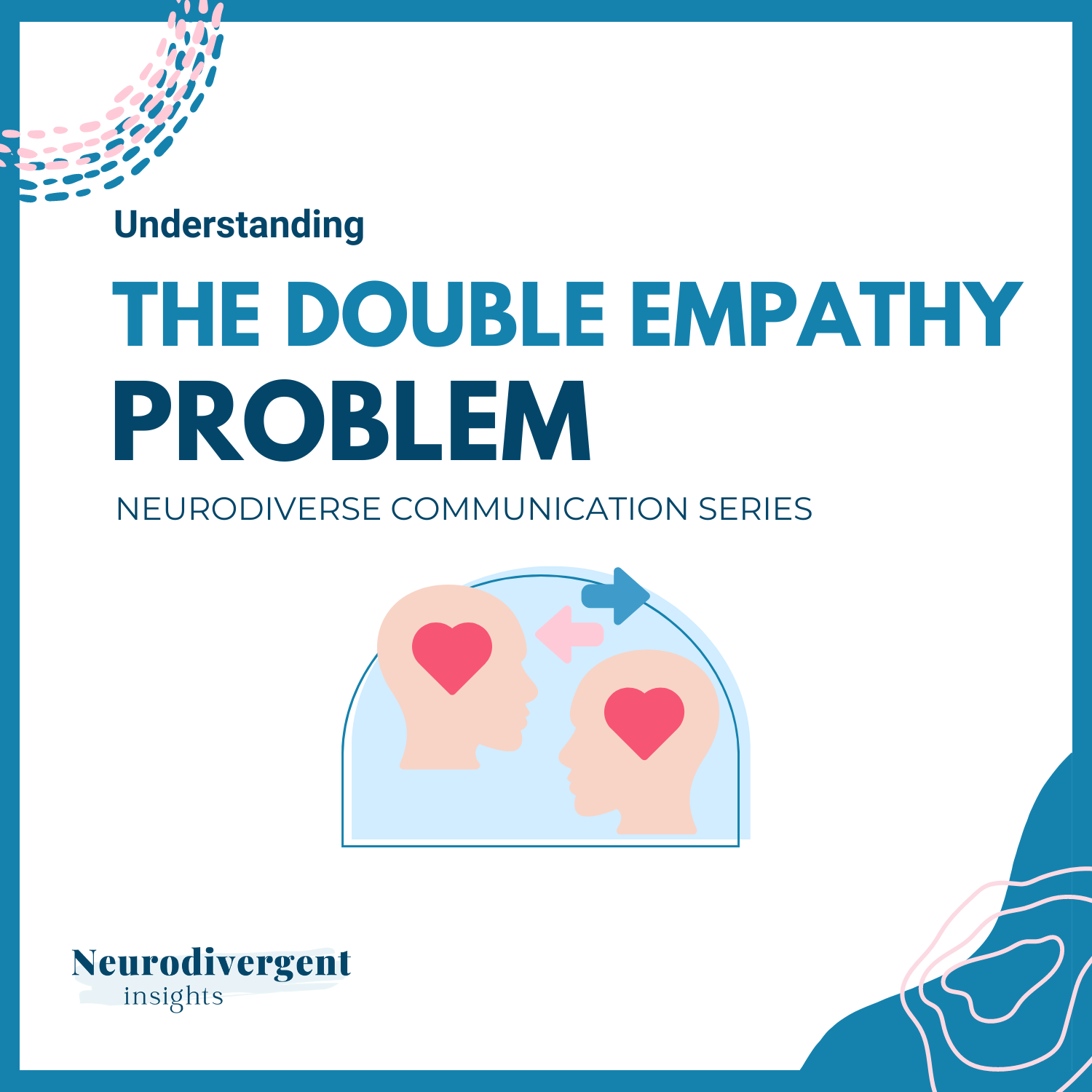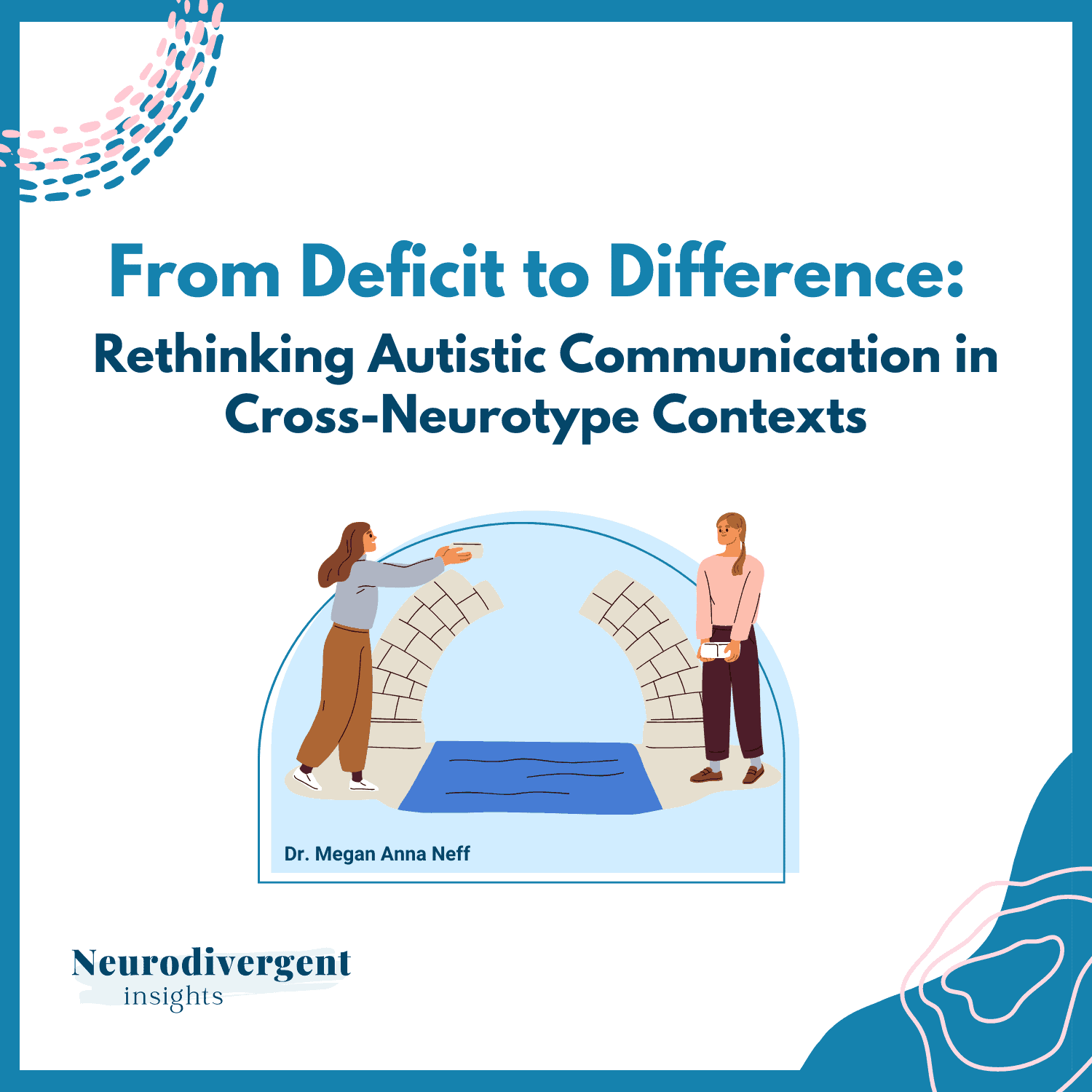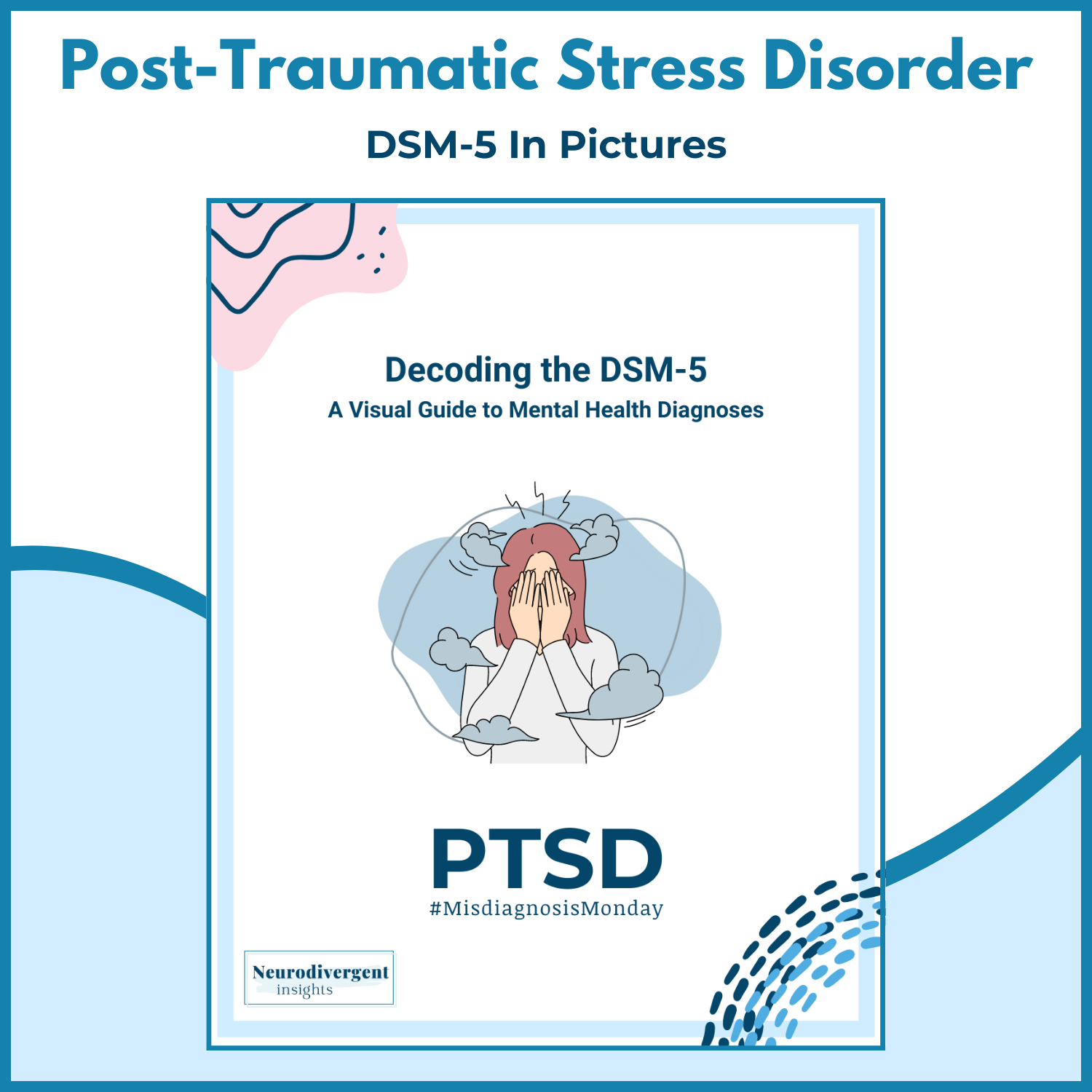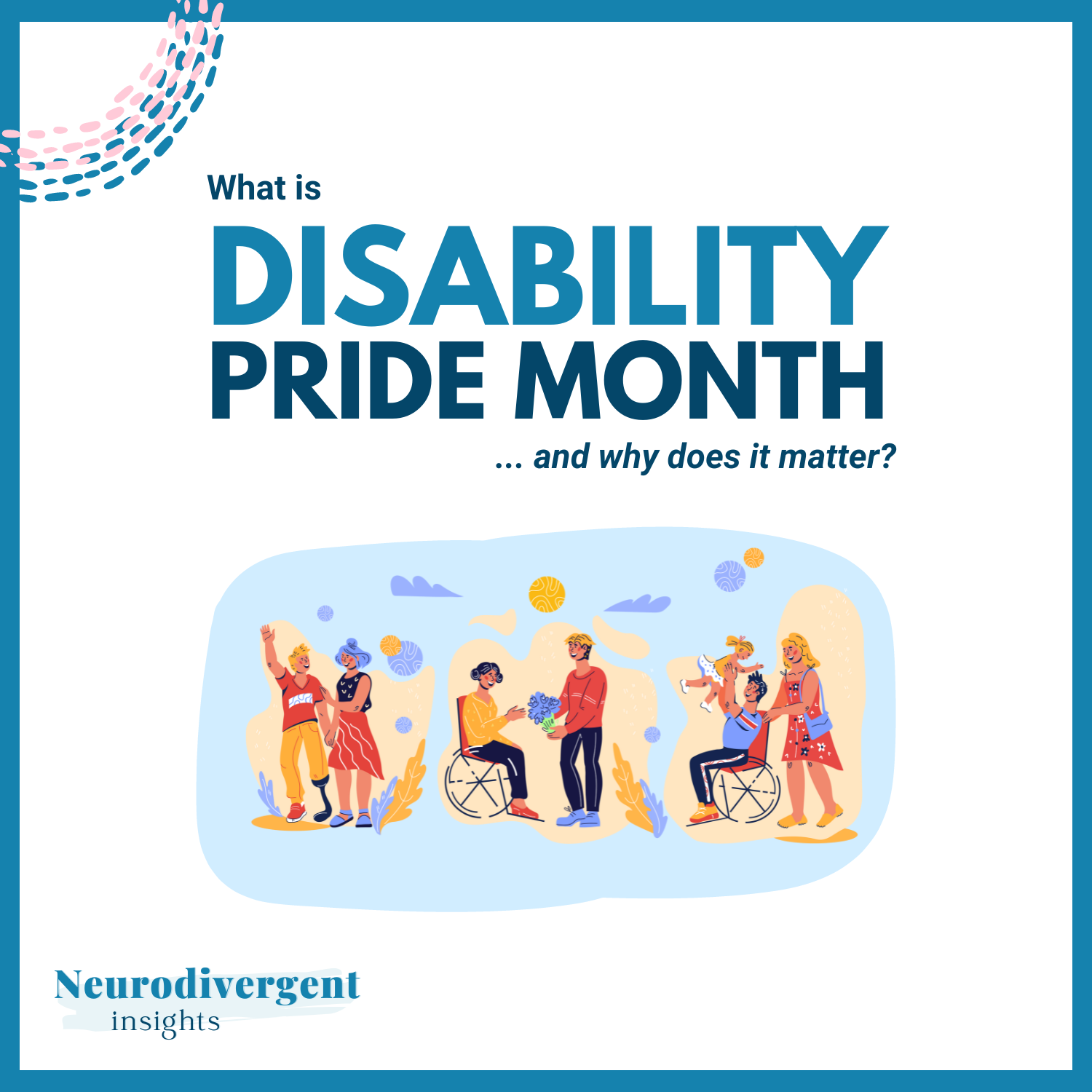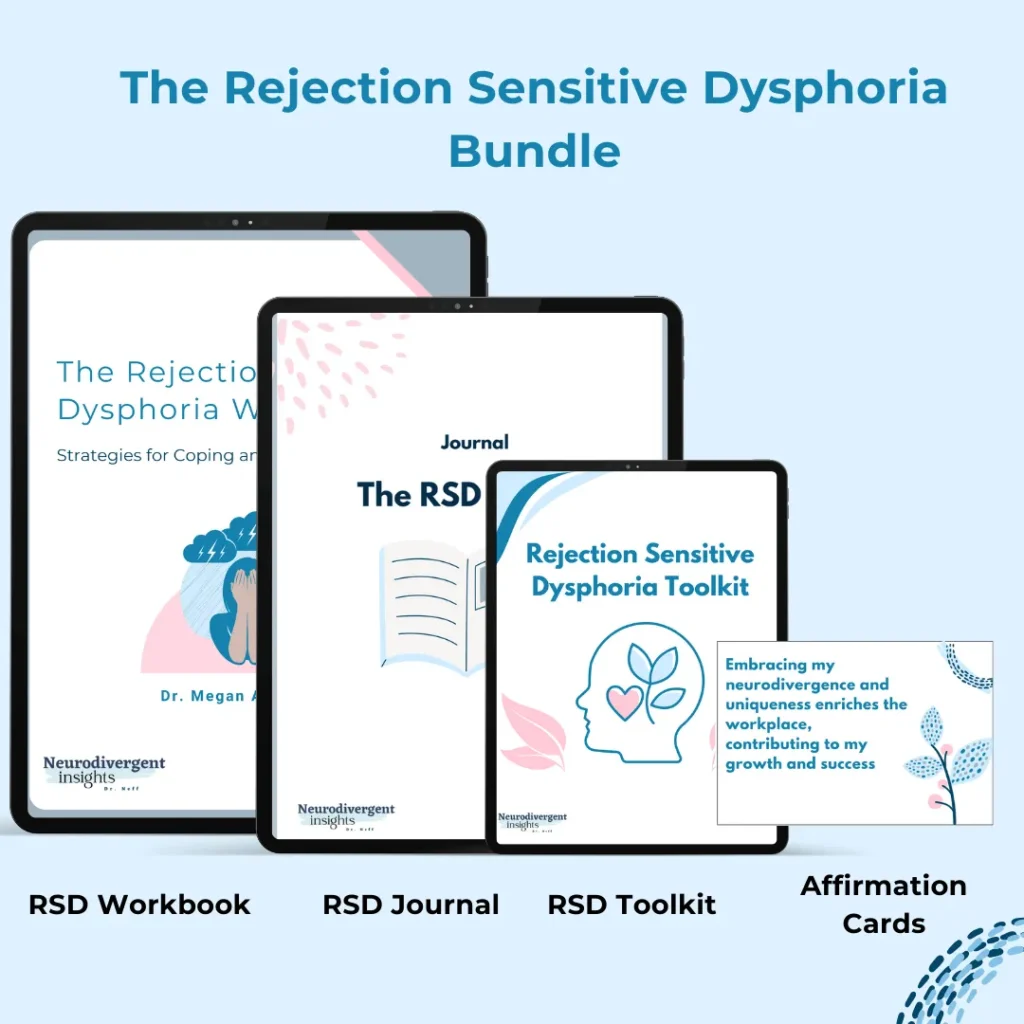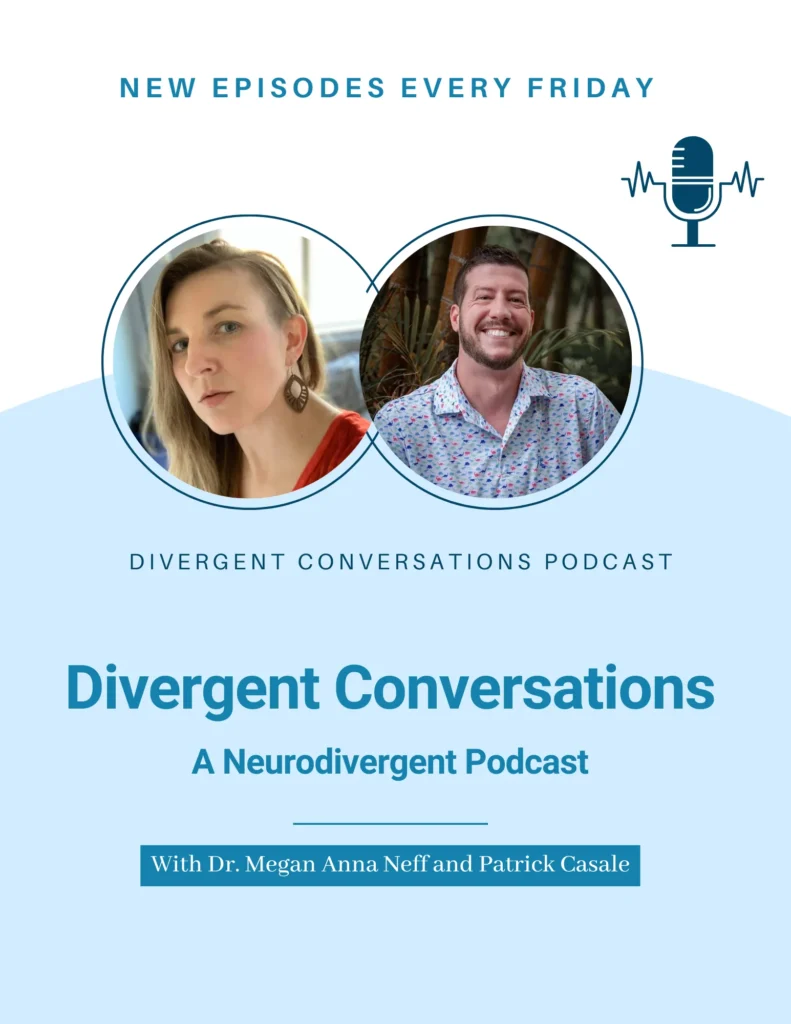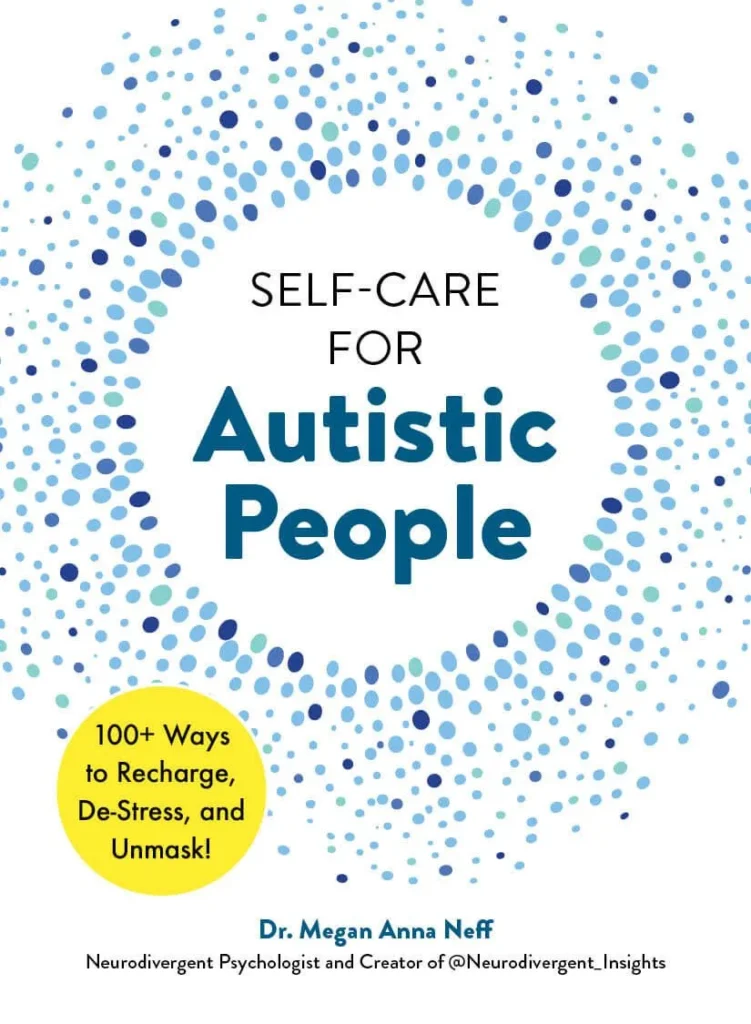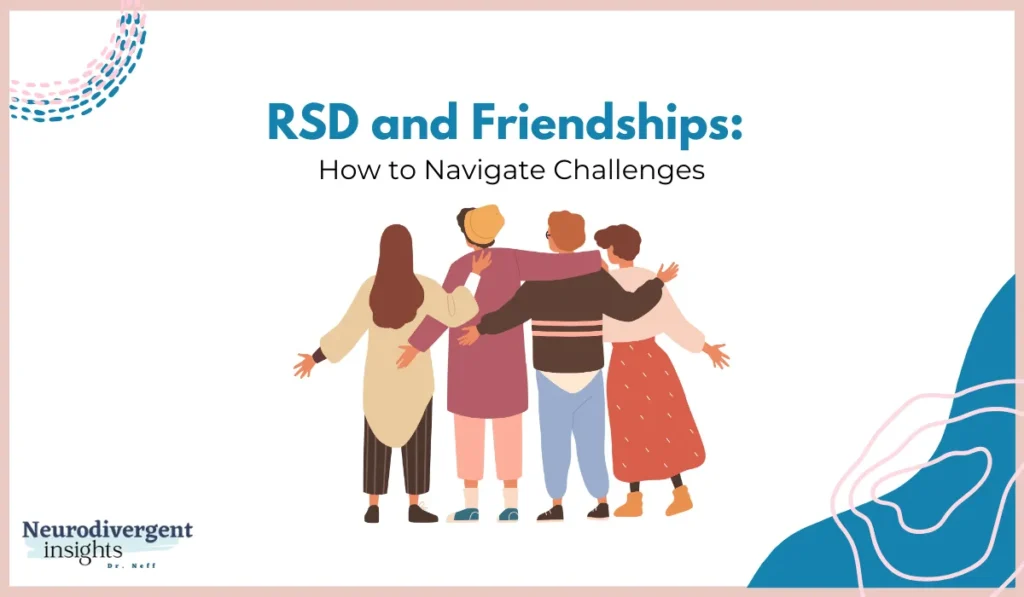
Have you ever found yourself drifting away from a friendship over a minor mishap? Or perhaps you’ve felt hurt by what seemed like a small offense and chose to distance yourself? Maybe you’ve struggled with the idea of opening up to new people due to fear of rejection. If you can relate to these situations, you might be familiar with the impact of Rejection Sensitive Dysphoria (RSD) on your social life.
Personally, I’ve witnessed how RSD can take a toll on my friendships. I’ve noticed that I tend to withdraw from a friendship if I believe I’ve let a friend down or if I fear disappointing them. This hesitancy to put myself out there has certainly affected my social interactions. If you have ADHD and RSD, and it’s affecting your friendships, you’re not alone. In this blog post, we’ll explore various aspects of RSD, its connection to friendships, and practical strategies to navigate it.
Throughout this blog post, we’ll cover:
A brief explanation of Rejection Sensitivity Dysphoria and its defining characteristics
An exploration of the complications that can arise, such as the tendency to avoid social situations to evade rejection.
The unique complexities of managing RSD within the context of friendships, along with actionable tips to address them.
6 realistic things you can do to help find your people without masking
A comprehensive guide on ways to work with your Rejection Sensitive Dysphoria
Resources that could help RSD and Friendship
What is Rejection Sensitive Dysphoria (RSD)?
Rejection Sensitive Dysphoria, often referred to as RSD, is an intense emotional reaction to rejection or the perception of it. This experience is notably common among people with ADHD, and many express emotional distress and physical discomfort when they encounter rejection. The impacts of RSD can significantly affect our self-esteem and relationships, which can add complexity to our experiences, especially in professional settings.
Think of RSD as an incredibly sensitive rejection radar, finely attuned to even the subtlest signs of rejection. It magnifies our emotional responses when we face perceived rejection or criticism, heightening the impact of our social interactions. Even the slightest hint of disapproval or negative feedback can trigger overwhelming emotions for those navigating RSD.
Perceived Rejection
What makes Rejection Sensitive Dysphoria (RSD) especially complex is that it’s triggered not only by actual rejection but also by the mere perception of it. This can include situations like not receiving a smile, a greeting, or positive feedback, which can set off RSD.
Having RSD is like wearing glasses that interpret the world as if it’s rejecting you. As Dr. Dodson wisely puts it, “What you’re looking for, you tend to find.” So, with our RSD glasses on, our brains become hyper-tuned into signs of rejection, making us more prone to interpreting signals of exclusion, even when they’re not real. It’s as if we’re always on the lookout for rejection cues, intensifying the strong emotions associated with RSD.
This tendency to perceive rejection, even in situations where it may not actually exist, underscores the importance of addressing “perceived rejection.” The feelings of the person experiencing it are genuine, but the rejection itself may not objectively occur. For instance, consider telling a joke that doesn’t receive laughter. Even if the person didn’t intend to reject you (perhaps they were distracted or the joke didn’t land), you might feel rejected because they didn’t laugh – this is what we call perceived rejection.
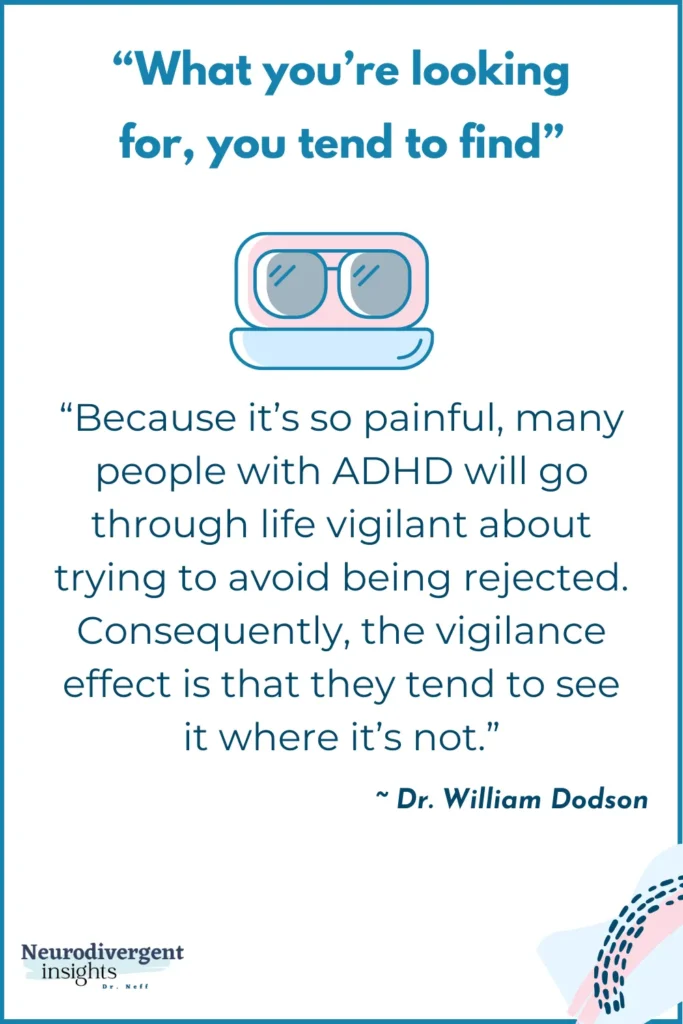
This heightened sensitivity to spotting rejection, even when it’s not present, poses a significant challenge in dealing with RSD. Our minds are wired to pick up even the smallest hints of rejection, leading us to constantly search for these cues in our surroundings. Unfortunately, this can reinforce our belief that we experience more rejection than we actually do.
Characteristics of Rejection Sensitive Dysphoria
Rejection Sensitivity Dysphoria (RSD) is characterized by a set of core features that uniquely shape its impact:
Heightened Emotions: RSD amplifies emotions, resulting in reactions that may appear disproportionate.
Swift Emotional Shifts: Those affected by RSD frequently experience rapid mood swings triggered by perceived rejection.
Physical Manifestations: Emotional distress associated with RSD can manifest as physical discomfort, adding a tangible layer to the experience.
Self-Image Struggles: RSD often leads to diminished self-esteem, as people contend with recurrent feelings of inadequacy.
Analyzing Social Cues: People with RSD meticulously scrutinize social cues, at times misinterpreting innocent gestures as indicators of rejection.
Emotional Turbulence: RSD can generate emotional storms characterized by large bouts of sadness, anger, or frustration.
Social Avoidance: Many people living with RSD tend to avoid social interactions due to a fear of potential rejection or criticism.
Professional Impact: In the workplace, RSD may discourage engagement in situations involving feedback or critique, which could impede career progression.
Severe Emotional Pain Response to Rejection
In the world of Rejection Sensitive Dysphoria (RSD), a defining feature is the excruciating emotional pain that accompanies the mere hint of rejection. This heightened sensitivity magnifies emotional wounds. Even the subtlest sense of being rejected can trigger an overwhelming storm of emotional distress.
As Dr. Dodson, a respected psychiatrist, and ADHD researcher, poignantly describes it, ‘Criticism or rejection is something no one welcomes, but for individuals with ADHD, it can, at times, be shattering. It’s as if it knocks them off their feet, leaving them to describe it as a sensation akin to being physically struck or stabbed in the chest.’ Dr. Dodson’s words vividly illustrate the huge impact that RSD can have on those who grapple with it.
When we turn our attention to friendships, this heightened emotional response to perceived rejection takes center stage. People with RSD find themselves navigating a landscape where even the slightest hint of rejection can cause intense feelings of hurt and anxiety. These emotions, in turn, influence the way they engage with their friends, adding complexity to their interactions.
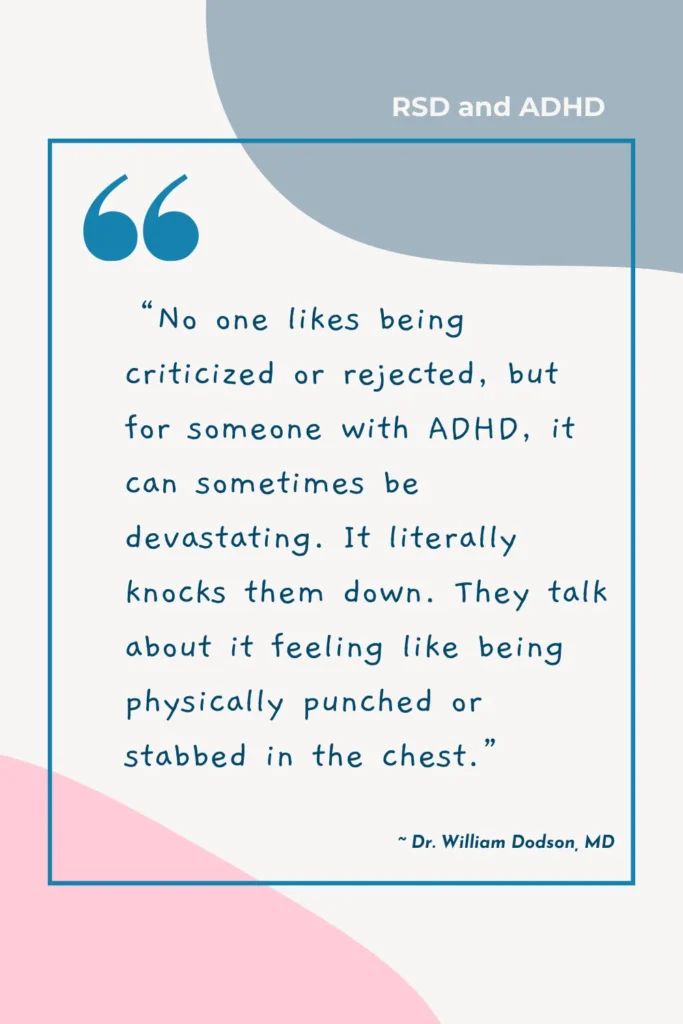
Physical Pain Response to Rejection
People frequently describe experiencing physical discomfort when faced with rejection or the perception of it. Many liken it to a sensation similar to being punched in the stomach or encountering other intense physical reactions.
Scientific research indicates that social rejection can activate specific brain regions responsible for processing both physical and emotional pain. Additionally, the level of physical discomfort is directly linked to the intensity of the perceived rejection. Put simply, the more profound the sense of rejection, the more pronounced the physical discomfort.
A study discovered that reflecting on a recent romantic breakup triggered both emotional and physical pain responses in the brain (Kross et al., 2011). In essence, when people express that rejection is painful, it isn’t merely a figure of speech – it’s a genuine, tangible experience.
This same logic applies to friendships. When someone with RSD experiences a falling out or a friendship ending, the emotional pain they endure can translate into genuine physical sensations. It’s not uncommon for them to feel knots of tension or discomfort as if their body is responding to the emotional turmoil within.
Avoidance of Social Situations
Navigating social situations takes on a unique dimension for people grappling with RSD. The fear of rejection becomes a powerful motivator to shy away from social gatherings, as the mere thought of potential rejection can stir up strong emotions.
Consider a scenario where a person with RSD is asked to join a new social club or team. While many might view it as an exciting opportunity, for someone with RSD, it can become a source of overwhelming anxiety and apprehension. The fear of possible rejection or negative judgment often leads them to hesitate or even avoid joining such groups altogether.
The avoidance strategy employed by individuals with RSD serves as a coping mechanism, offering protection from the emotional turmoil associated with potential rejection. However, it frequently sets off a self-reinforcing cycle that constrains social interactions and gives rise to feelings of isolation. By steering clear of social situations, people may inadvertently hinder their ability to form new friendships and strain existing ones.
Friends may misinterpret this avoidance as disinterest or withdrawal, which can impact the depth and longevity of these vital relationships. What’s more, this avoidance tendency tends to amplify anxiety, creating a self-perpetuating loop that can be challenging to break free from.
Avoidance of Circumstances Where Criticism is Possible
Adding to the complexity, individuals with RSD might not only steer clear of initiating new relationships but also avoid aspects of existing ones that carry the potential for criticism or negative emotions. For instance, navigating interpersonal conflicts or disagreements can be particularly challenging for someone with RSD, as these situations often entail the risk of facing criticism.
This avoidance pattern can significantly hinder the development and deepening of friendships. It restricts opportunities for authentic connections and emotional intimacy, making it harder to establish trust and vulnerability. Consequently, this barrier can impede the natural progression of relationships, making it challenging for both new and existing friendships to thrive and reach their full potential.
Unique Challenges of RSD and Friendships
In the context of friendships, RSD introduces specific challenges, some of these can include:
Difficulty Trusting Intentions:
People grappling with RSD often face difficulties in trusting the intentions of their friends. This challenge can lead to misunderstandings, as they may misinterpret well-meaning actions or words as signs of rejection or criticism. Nurturing and sustaining trust in friendships becomes a delicate balancing act for them.
2 Practical Steps to Improve Trust:
✦ Open Dialogue: Encourage open and honest communication with your friends. Share your challenges associated with RSD, clarifying that it’s not a reflection of their actions but rather a result of your heightened sensitivity.
✦ Educate Your Friends: Offer resources or information about RSD to your friends to enhance their understanding. Knowledge can foster empathy and strengthen their support.
Overanalyzing Interactions:
People with RSD often fall into the habit of overanalyzing their interactions with friends. They tend to dissect conversations and behaviors, relentlessly searching for any hint of rejection. This constant analysis can lead to heightened anxiety and may strain friendships as they grapple with the perceived threat of rejection.
2 Practical Steps to Break Free from Analysis Paralysis:
✦Mindfulness Practices: Explore mindfulness exercises to anchor yourself in the present moment and disengage from distressing thought loops. You can find examples of these exercises in our Toolkit.
✦ Self-reflection and Reality-testing: Cultivate self-reflection and reality-testing techniques to distinguish between genuine signs of rejection and perceived ones. Journaling or engaging with a therapist can support this process.
Fear of Vulnerability:
For people with RSD, opening up and embracing vulnerability within friendships can be an uphill battle. The fear of potential rejection or criticism often leaves them reluctant to share their innermost thoughts, feelings, or personal experiences. This apprehension around vulnerability can impede the deepening of friendships, as genuine connections thrive on openness and trust.
2 Practical Steps to Navigate Fear of Vulnerability:
✦ Gradual Disclosure: Begin by sharing less vulnerable aspects of yourself with friends. Gradually progress to more significant disclosures as trust and comfort levels grow.
✦ Seek Supportive Friends: Surround yourself with friends who create a safe and accepting space for vulnerability. Building connections with understanding individuals can empower you to be authentic and open in your interactions.
Unhelpful Coping Mechanisms:
In dealing with the intense emotional responses triggered by RSD, individuals may resort to less-than-ideal coping strategies. Some might withdraw from social interactions, isolating themselves to avoid potential rejection, while others may react with emotional outbursts or lashing out when they perceive rejection. These coping mechanisms can strain friendships and create obstacles to effective communication and connection.
2 Practical Steps for Improved Coping:
✦ Emotional Regulation Techniques: Explore strategies for emotional regulation, such as deep breathing, meditation, or progressive muscle relaxation. These methods can help manage intense emotional reactions (you can find more details further down in the blog or in our Toolkit).
✦ Consider Professional Support: If you frequently find yourself withdrawing or reacting strongly, it may be beneficial to seek professional help. A therapist can assist you in developing healthier coping mechanisms and improving your emotional well-being.
Difficulty in Conflict Resolution:
For people with RSD, managing conflicts within friendships can be a daunting task. The fear of criticism may impede their ability to engage in constructive discussions, assert their needs, and establish boundaries, potentially resulting in unresolved issues and misunderstandings.
3 Practical Strategies for Improvement:
✦ Communication Scripts: Prepare and rehearse communication scripts in advance for anticipated challenging conversations. Having a script can help you express your thoughts and feelings clearly and confidently, reducing the fear of criticism as you stick to your planned points. Scripts are particularly helpful when asserting a boundary or practicing self-advocacy skills.
✦ Use “I” Statements: When facing conflicts, utilize “I” statements to convey your feelings and needs. For instance, say, “I feel hurt when…” rather than “You always…” Framing your statements with “I” fosters a less confrontational atmosphere and makes it easier to assert your needs.
✦ Conflict Resolution Training: Explore opportunities for conflict resolution training, workshops, or readings. These programs offer valuable practical strategies and communication skills that can enhance your ability to navigate conflicts more effectively, ultimately reducing the fear and anxiety associated with conflict. A great starting point is exploring Non-Violent Communication Theory and tools, which can provide powerful techniques for handling conflict compassionately and empathetically.
How to Navigate RSD and Friendships
When it comes to navigating RSD and friendships, I like to break it down into two primary categories:
Finding Your People
Managing RSD Triggers and Dynamics
Finding your people is crucial because, as neurodivergent individuals, we often face misunderstandings and misperceptions. Connecting with those who understand and relate to your experiences can reduce some of the friction that can occur in interactions across different neurotypes. However, even within these supportive circles, you may still encounter RSD challenges. Therefore, learning how to effectively manage RSD is an important skill to cultivate.
6 Strategies to Help You Connect and Find Your People
Building new and meaningful connections can sometimes pose unique challenges for neurodivergent individuals. Often, societal norms and expectations encourage us to mask our true selves to fit into neurotypical friendship dynamics—suppressing our authentic selves, adjusting our behavior to conform, and ignoring our instincts, among other things.
Ideally, we’d all live in a world where the social model of disability prevails, recognizing that disability itself isn’t the issue, but rather society’s lack of flexibility and accommodations. However, we understand that this ideal may not be the reality in all situations. Nevertheless, these strategies can be valuable in navigating social interactions and finding your people.
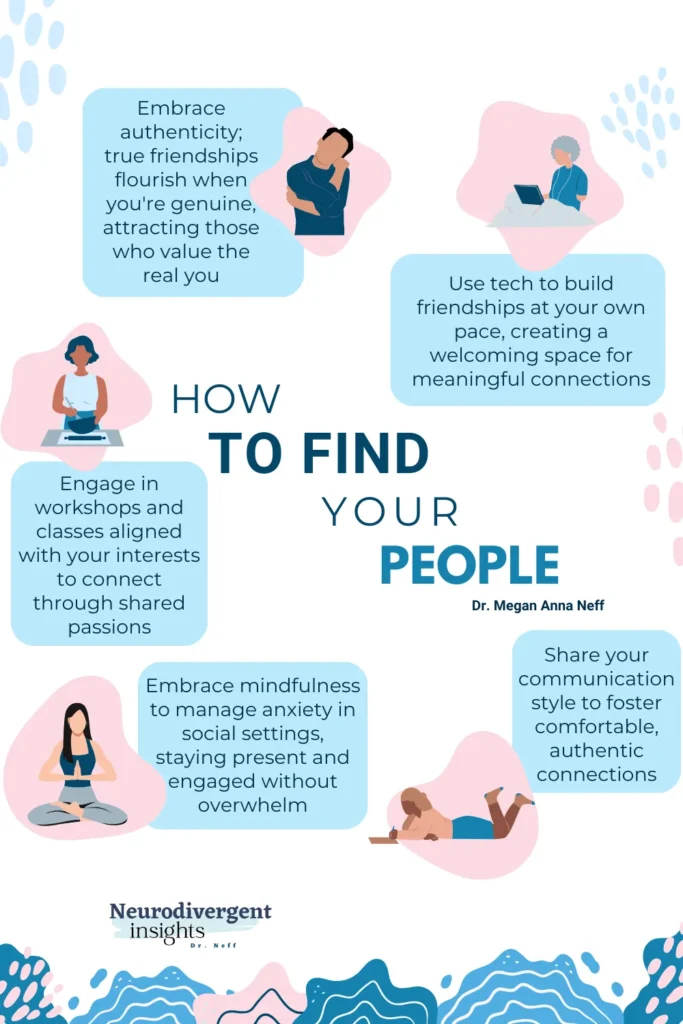
Embrace the digital world: Think about using technology like text messages, video chats, or online platforms as your trusty sidekicks on the journey to making friends. These digital tools offer a comfortable and convenient way to hone your communication skills and nurture meaningful connections. Know that there’s a welcoming space for you to build friendships at your own pace and in a way that feels just right.
Connect with others who share your unique experiences and identities (via forums, special interest events, and hobbies): When you seek friendships within your own community, you often discover a warm embrace of understanding and acceptance that can be truly empowering. This eventually translates to trust and confidence, helping to create further friendships and relationships. There is nothing like finding a place where you truly belong.*
Share Your Preferred Communication Style: Letting others know how you prefer to communicate—whether it’s verbal, written, through text, or video—plays a crucial role in creating a comfortable and open space for friendships and relationships to flourish. It allows you to be your authentic self.
Engage in Workshops: Engage in workshops and classes aligned with your interests to connect through shared passions.
Practice Mindfulness: Learning mindfulness techniques can help manage anxiety in social settings. It allows you to be present and engaged without feeling overwhelmed.
Be Yourself: I encourage you to embrace your authenticity. True friendships are built on genuine connections, so being yourself will attract people who appreciate you for who you are.
.* The highlight of my year has been building out a community where neurodivergent people get to connect authentically. Doors to new members will open this winter; if you’d like to be notified when doors re-open, you can sign up for the waitlist here.
6 Practices for Working With RSD
When it comes to handling RSD triggers, there are various strategies that can significantly assist us in working through them. For those with ADHD, psychopharmaceutical support can be incredibly beneficial. Alongside this support, consider integrating the following practices into your daily life:
Identify Your Triggers
Catch the story
Write it out
Practice Emotional Acceptance
Emotionally Distancing
Emotion Regulation Strategies
Affirmations
Identify Your Triggers
One of the first steps in managing rejection sensitivity is to pinpoint the specific triggers that tend to activate these intense emotional reactions. By identifying the situations, people, or events that commonly set off your rejection sensitivity, you can gain a deeper level of self-awareness. This awareness not only helps you understand the patterns and triggers at play but also empowers you to prepare and respond more effectively when confronted with these challenging situations.
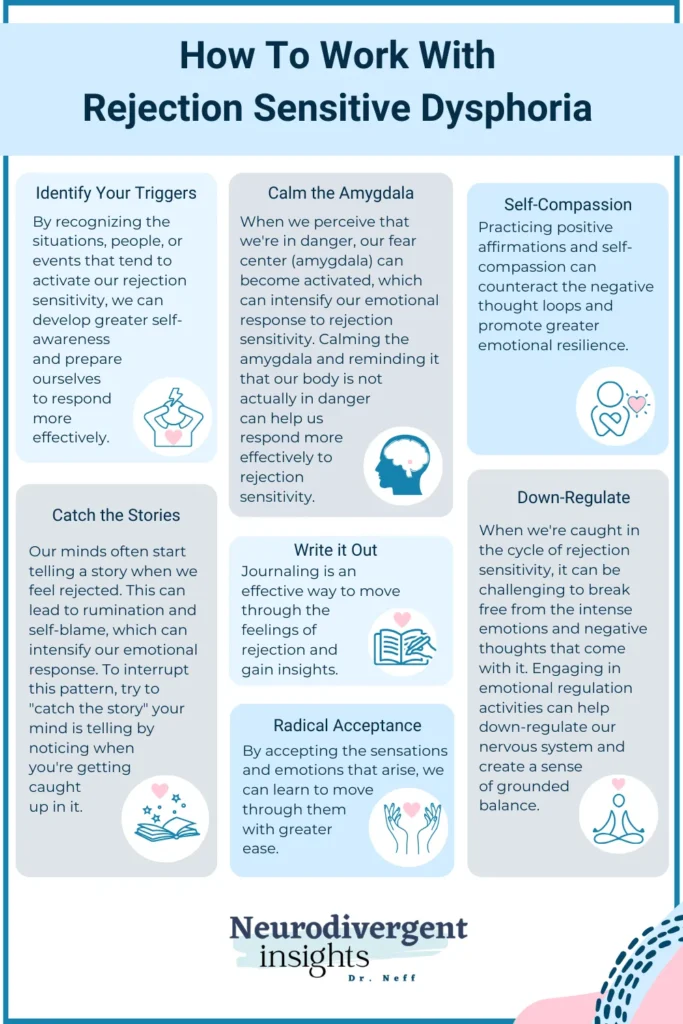
Catch the Story
In the face of rejection, our minds tend to construct negative narratives, setting off a chain reaction of rumination and self-blame. To disrupt this cycle, develop the habit of “intercepting negative narratives” and “catching the story.” Start by acknowledging when these narratives are unfolding, and take a moment to observe your thoughts and emotions without passing judgment. Give these narratives a label to create distance from them. As you practice this technique over time, you’ll become more adept at recognizing and breaking these patterns. This process empowers you to take charge of negative thought patterns, realizing that they are products of your mind rather than immutable truths.
Put It in Writing
Expressing your weighty thoughts in writing can be surprisingly soothing. It not only confines them but also aids in articulating and comprehending them, relieving your emotional burden. Recognize the recurring narratives provoked by rejection sensitivity in professional settings, such as feeling inadequate, unappealing, or undeserving of acknowledgment. If you have artistic inclinations, contemplate crafting illustrations that depict these encounters.
RSD Journal Prompts
Studies indicate that writing about your emotions and the possible consequences following a rejection experience may expedite the processing of those emotions and facilitate moving forward (Rude, Mazzetti, Pal, & Stauble, 2011). While open-ended journaling can be beneficial, having prompts can be especially helpful. You’ll discover numerous journal prompts to kickstart your exploration of RSD in the RSD Journal resource, particularly in the context of relationships and friendships.
Embrace Your Emotions: Practice Emotional Acceptance
Embracing your emotions without judgment or resistance is a valuable skill in handling feelings of rejection, particularly for neurodivergent individuals. Nonetheless, emotional acceptance can present challenges influenced by factors like alexithymia, societal stigma, or past trauma. To overcome these obstacles, make an effort to recognize and permit your emotions without attempting to alter them. While it may require time and practice, this approach can offer clarity and diminish self-criticism.
Emotional Detachment
If you’re facing difficulties with emotional acceptance, consider exploring emotional distancing as an alternative approach. This method involves observing your experience of rejection from an external standpoint, like that of an observer or passerby. This outside perspective can contribute to the quicker dissipation of negative emotions (Ayduk & Kross, 2010).
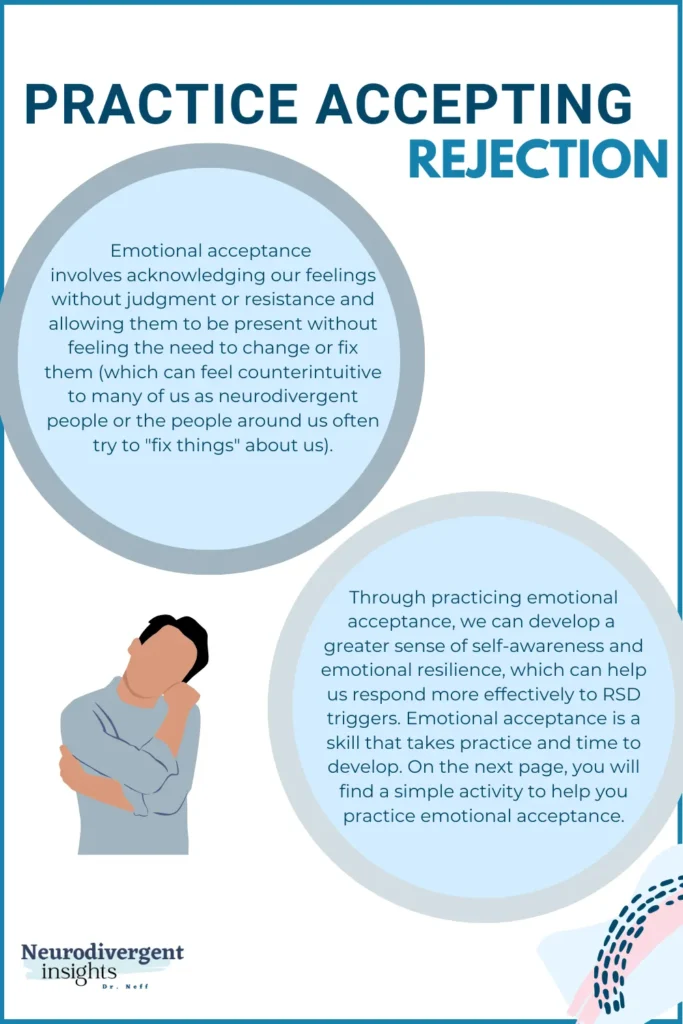
The previously mentioned exercise, referred to as ‘catching the story,’ serves as a practical example of emotional distancing. It aids you in gaining a fresh perspective and creating distance from your negative thoughts and emotions.
Emotional Regulation Strategies
When rejection sensitivity is triggered, it often activates a stress response in our body, which can include a fight-or-flight reaction. Engaging in emotional regulation techniques can help calm the amygdala and regulate our nervous system. It’s important to explore various techniques and find what works best for you, as everyone responds differently to these strategies. Consistent practice can lead to improved emotional control and self-care.
Deep Breathing Exercises
When we experience rejection, our body may perceive it as a threat to our safety. Deep breathing can communicate to the nervous system that it is safe. Deep breathing exercises work by helping to activate the relaxation response. For a simply deep breathing exercise:
Breathe in deeply through your nose for a count of 4.
Hold for 1-2 seconds.
Slowly release your breath out through your mouth for a count of 6 (note it is the extended exhale that is particularly important for activating the relaxation response).
Progressive Muscle Relaxation
Progressive Muscle Relaxation (PMR) is a calming method that tells your body it’s safe. You tense and then relax various muscle groups, beginning with your feet and working up. This triggers your body’s ‘relaxation response,’ which lessens the emotional impact of stress, like rejection. PMR eases muscle tension and promotes overall relaxation. If you find it hard to release tension, especially if you’re neurodivergent, try a body scan with tension release and visualization; the visualization helps a lot. I recommend listening to a guided script the first few times you try it. Dartmouth has a progressive guide.
Guided Meditations
Guided meditations are designed to activate relaxation responses and provide a calming experience, effectively diverting your attention from rumination associated with rejection sensitivity. They teach us to observe painful thoughts and emotions objectively, ultimately enhancing self-regulation. It’s worth noting that meditations may not be equally effective for all neurodivergent individuals. Personally, I’ve found that more active meditations, such as those with a highly visual component, work well for me, while slow-paced “empty your brain meditations” tend to increase my stress levels. Therefore, it’s essential to experiment and discover meditations and visualizations that resonate with you.
For a list of guided meditations, click here. You can also explore more options in the Toolkit.
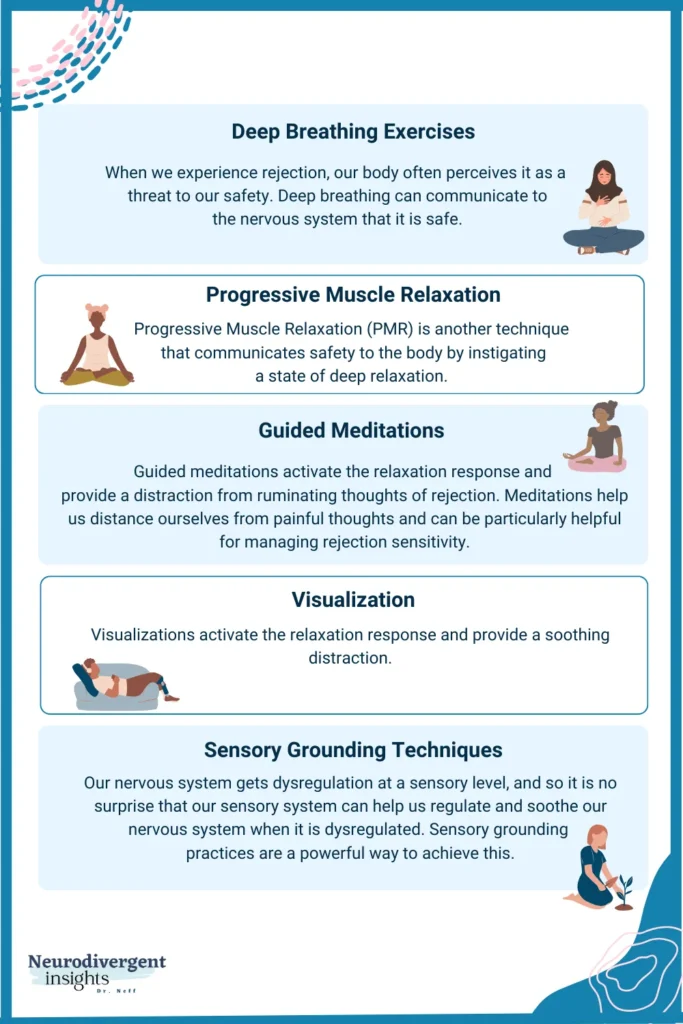
Sensory Grounding Practices
Engaging our five senses for grounding can be a powerful way to shift your focus away from distressing thoughts and emotions, allowing you to return to the present moment more effectively. Sensory grounding techniques, such as running your hands under hot water or savoring a cup of tea, can be particularly useful in managing emotional distress, especially in a work setting. To use these techniques, it’s important to identify what soothes you personally, whether it’s taking a warm bath, enjoying pleasant scents, or engaging in other sensory experiences. Concentrate on the sensation and, if necessary, redirect your attention to help regulate your nervous system and reduce the impact of rejection sensitivity. Consider preparing a list of soothing activities or items in advance for easier use during moments of intense emotion.
Visualizations
Visualizations are yet another valuable emotion regulation skill. By immersing ourselves in calming mental images or scenarios, we can trigger the body’s “relaxation response” and reduce the impact of stress, including that caused by rejection sensitivity. This technique also serves as a distraction, helping our minds disengage from the narratives associated with rejection sensitivity.
Incorporating visualization exercises into our daily routine fosters a sense of calm and helps create distance from distressing thoughts and emotions. Some individuals enhance their visualization experience with music, such as binaural beats or indigenous drumming, which can induce a trance-like state and deepen their immersion in the exercise. Playlists featuring this type of music can be found on platforms like Spotify and YouTube.
Self-Compassion and Acceptance
Breaking the cycle of rejection sensitivity involves practicing kindness and self-affirmation. Research indicates that experiencing different emotions can shift our overall mood. For instance, humor can replace anger and make us feel better. Self-compassion plays a crucial role in managing rejection by transforming our emotional state.
If showing kindness to yourself feels challenging, engaging in enjoyable activities such as weightlifting or pursuing creative hobbies can be beneficial. These activities promote self-care and are particularly helpful if you struggle with positive self-perception.
RSD and Friendship Affirmations
I am deserving of genuine and supportive friendships.
I recognize the worth I bring to friendships through my sensitivity and compassion, even when the challenges that come with these qualities may cause me moments of discomfort.
I have the strength to navigate conflicts and misunderstandings in my friendships.
I am learning to release the fear of rejection and embrace the joy of connecting with others.
My sensitivity makes me empathetic and attuned to others’ feelings, enriching my friendships.
My friends appreciate my authenticity and the depth of emotion I bring to our relationships.
I am open to vulnerability in my friendships, knowing that it can deepen our connections.
I am working to release the need for constant reassurance and trust in the stability of my friendships.
I am resilient and can bounce back from any challenges that may arise in my friendships.
My friends admire my ability to empathize and support them during difficult times.
I am worthy of love and acceptance from my friends, just as I am.
I attract friends who value my qualities and appreciate the depth I bring to our relationships.
I am becoming more skilled at setting boundaries in my friendships to protect my emotional well-being.
I choose to focus on the positive aspects of my friendships and let go of negative self-perceptions.
I understand that I am not everyone’s cup of tea, just as not everyone is my cup of tea, and I recognize that this is a natural part of being human. My worth is not determined by others’ opinions, and I value myself for who I am.
If you want affirmation cards to print and use, you can find those HERE.
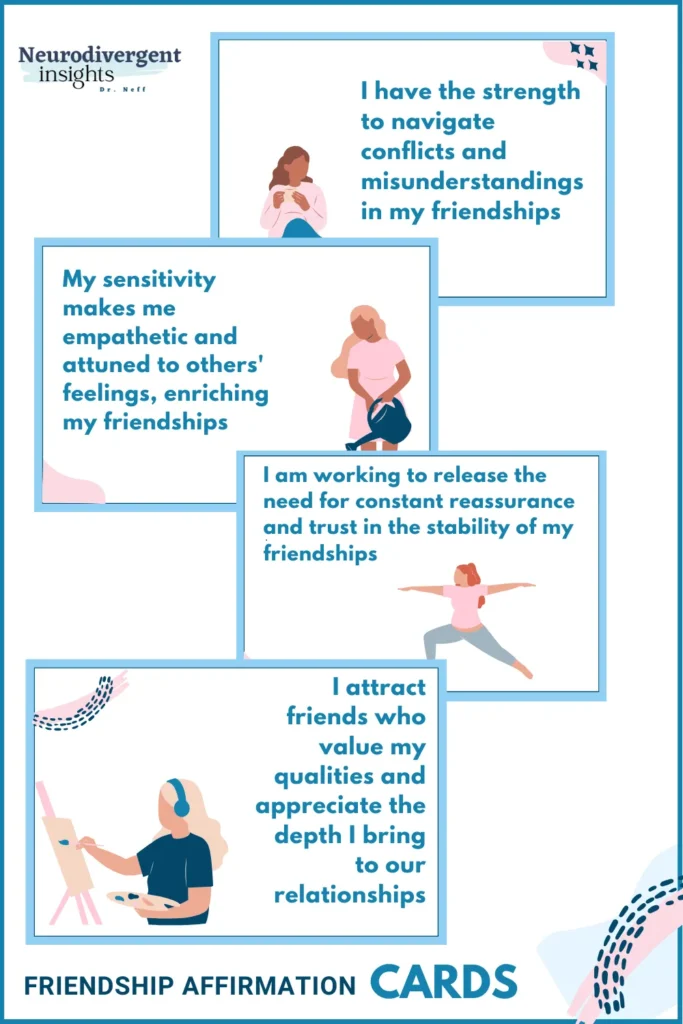
RSD and Friendships Resources
The RSD Bundle: Grab the Neurodivergent Insights RSD Bundle. The 160-page workbook provides a deep dive into RSD, which is laid out in a highly visual format that works for a lot of ADHD brains. Additionally, there is the toolkit, affirmation cards, and journal for further reflection and self-care worksheets.
ADDitude Magazine: ADDitude Magazine is a reliable source of information on ADHD-related topics, including RSD. They have articles and resources that discuss RSD and its effects on relationships and friendships. They also have an online forum so you can connect with like-minded people.
Books and Research Papers: Dr. William Dodson has written extensively about ADHD and RSD, and his books and articles can be valuable resources. His article “New Insights Into Rejection Sensitive Dysphoria” is a great starting place, as well as his webinar on RSD.
Headspace: Headspace offers guided meditation and mindfulness exercises, which can be beneficial for managing emotional responses and improving overall mental well-being, potentially helping with RSD.
Inflow: This app provides tools and resources specifically designed for people with ADHD, including strategies for managing emotions.
Daylio: Daylio is a mood-tracking app that can help monitor emotional patterns and identify potential triggers for RSD. This can be useful for self-awareness and self-regulation.
Summary
Rejection Sensitive Dysphoria (RSD) is a significant aspect of the neurodivergent experience, particularly in the context of friendships. RSD’s intricacies go beyond merely facing rejection; they involve the amplification of even the slightest hints of exclusion by our minds. This hypersensitivity can lead to emotional turbulence and push us towards social avoidance, impacting both personal and professional relationships.
Navigating friendships with RSD can be challenging, but effective strategies exist to manage it. Self-awareness plays a crucial role in recognizing triggers and understanding emotional responses. Techniques like journaling, visualization exercises, and self-compassion can be instrumental in managing symptoms. Sensory grounding practices, emotional regulation, and acceptance are also essential tools in dealing with RSD within the context of friendships.
Understanding the specific challenges that individuals with RSD encounter in friendships, such as trust issues and overanalyzing interactions, underscores the importance of communication, setting boundaries, seeking support, and fostering connections within your social circle or through external resources like coaching or therapy.
For neurodivergent individuals, finding “your people” in friendships is essential. While the world may not always provide instant connections, there are ways to expand your social circle without compromising your authentic self and mental well-being. Authenticity attracts people who appreciate and accept you for who you are, recognizing your inherent worth.
Although RSD presents real challenges, it is not insurmountable. With self-awareness, practical strategies, and supportive friends, you can navigate the complexities of friendships, develop resilience, and experience personal growth.
